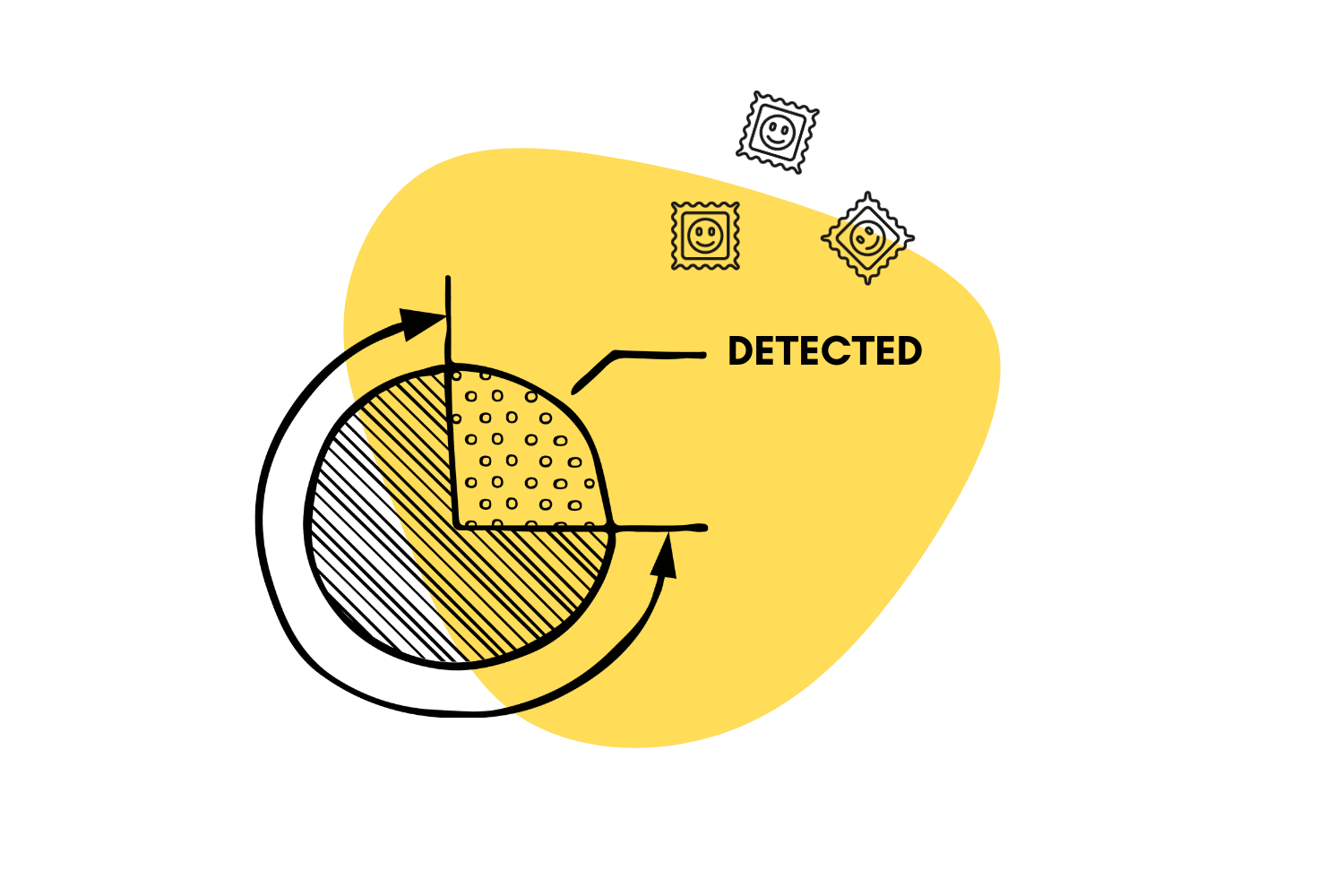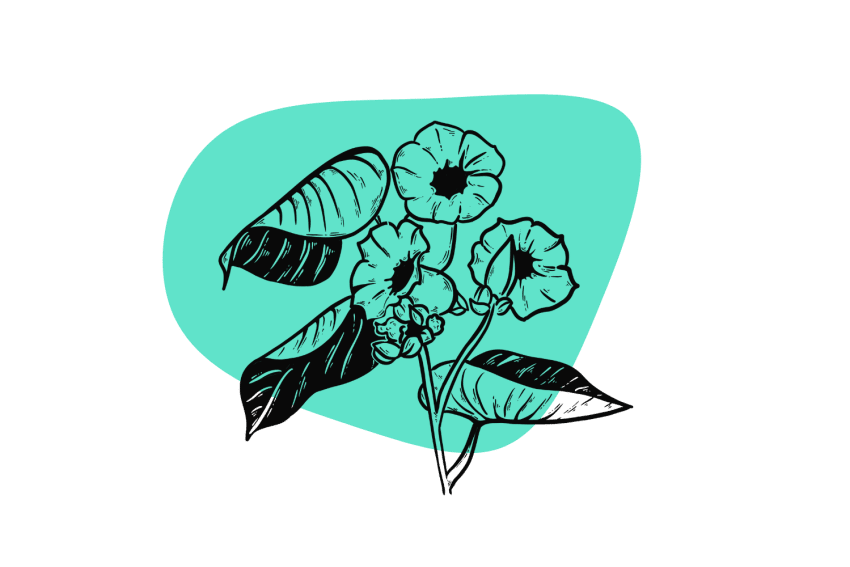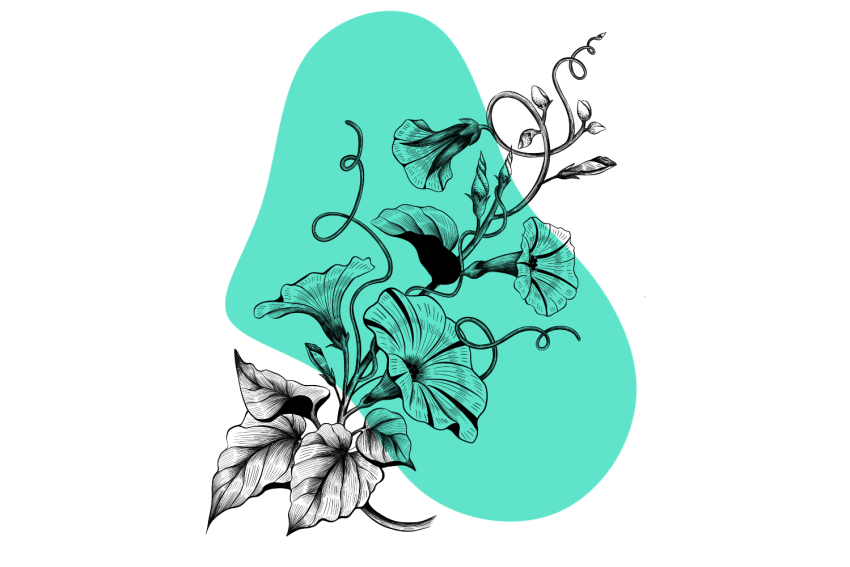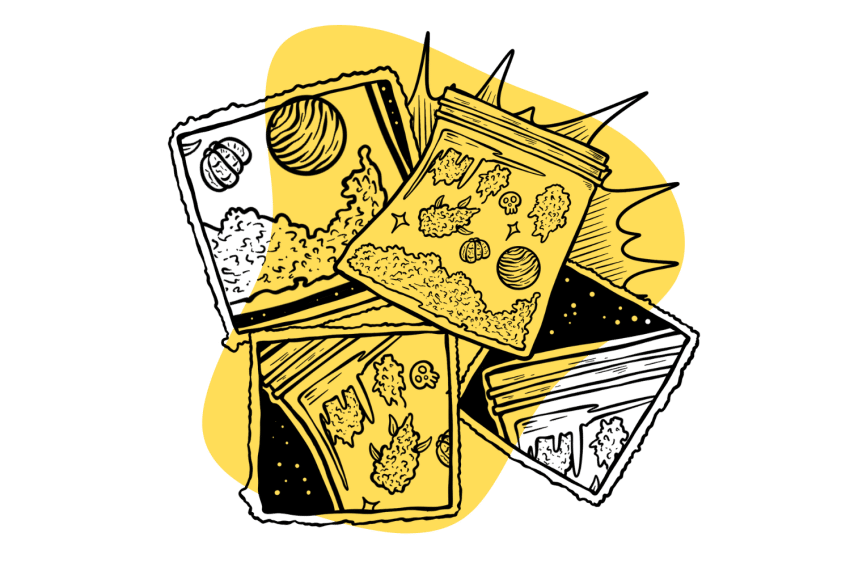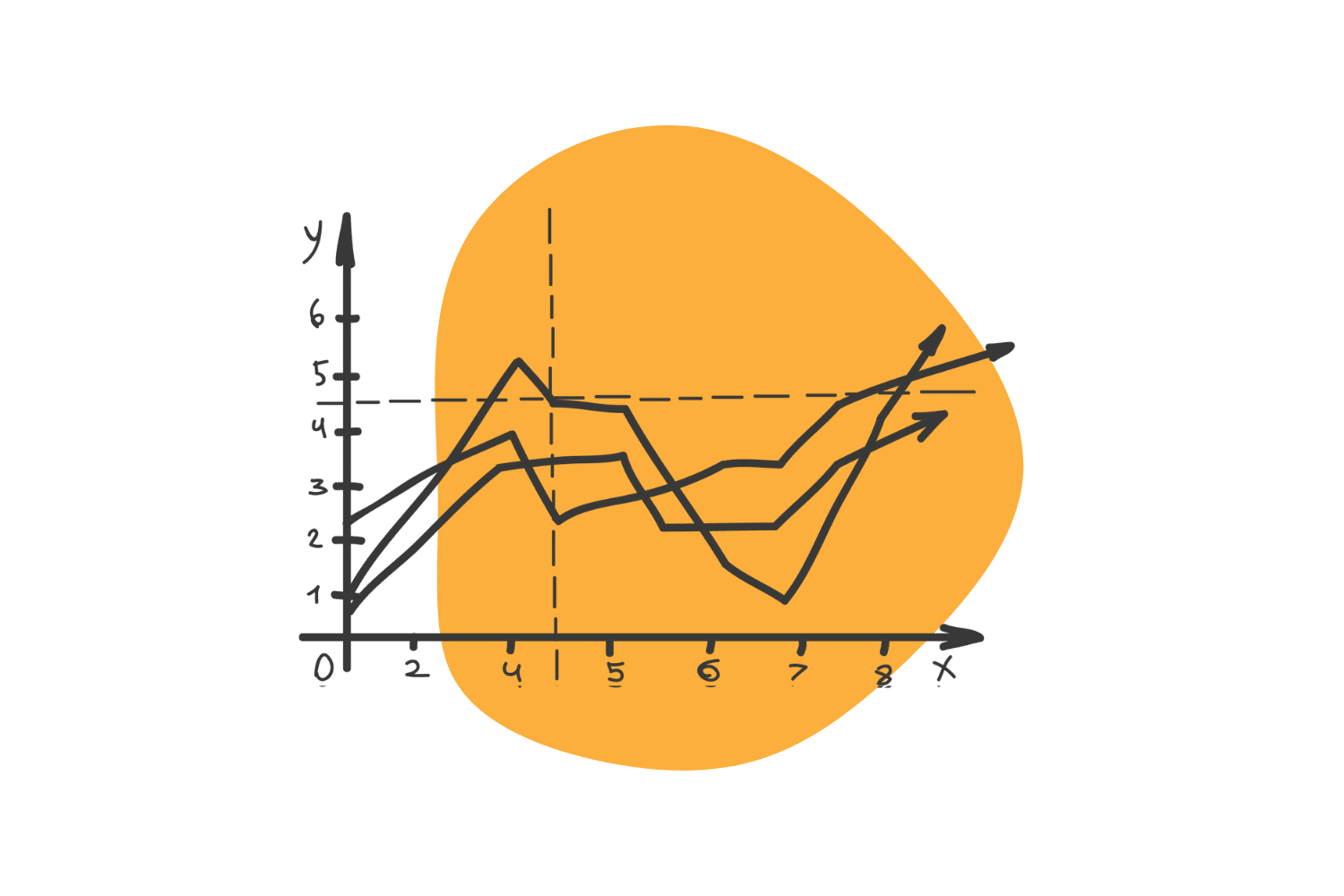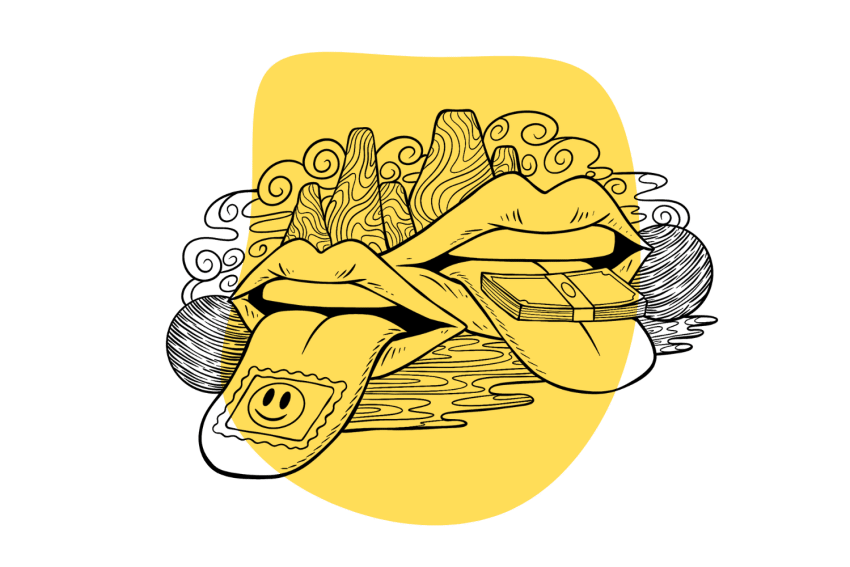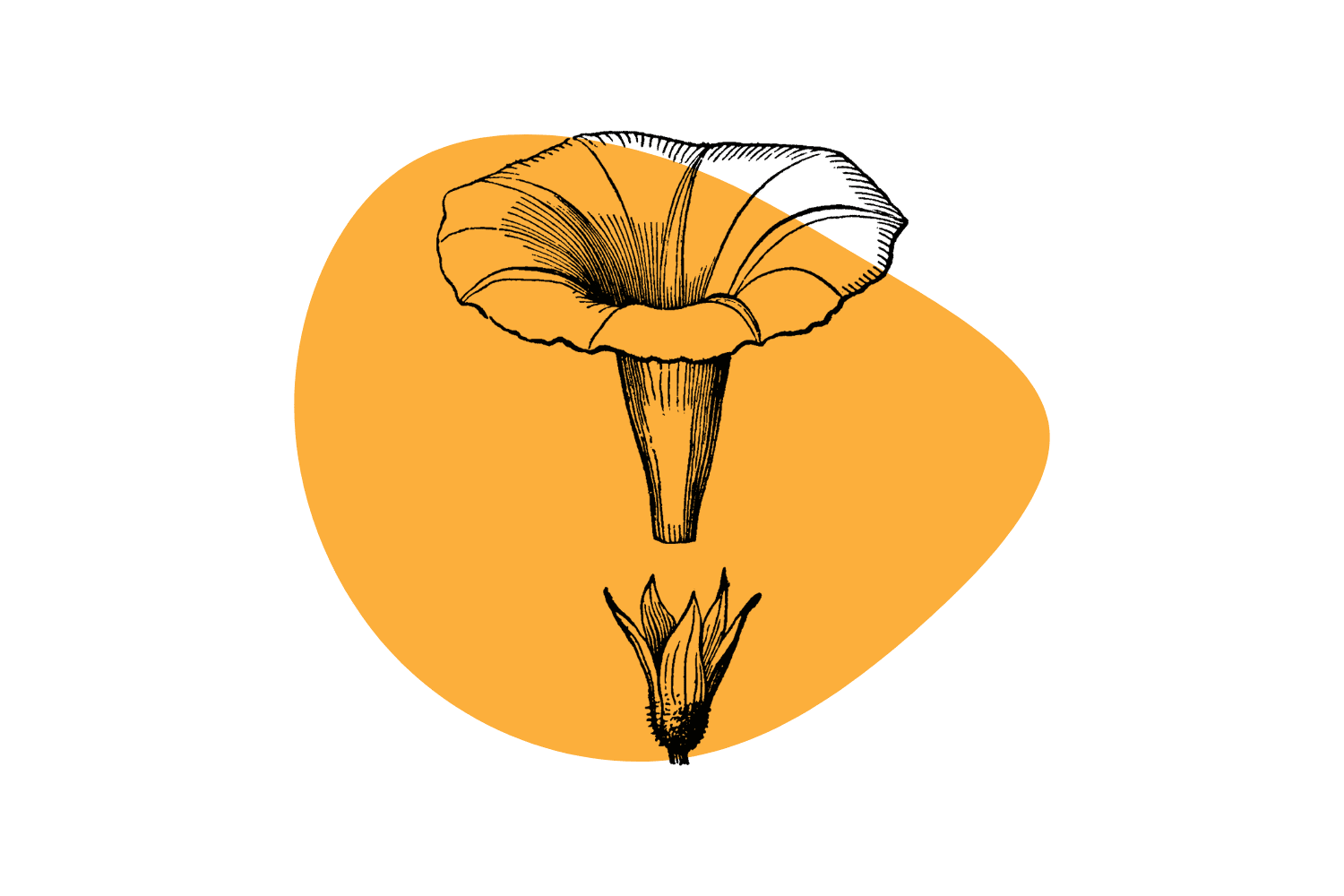LSD (Acid): Ultimate Guide To the World’s Most Famous Psychedelic
LSD is by far one of the most popular psychedelic drugs in the world — and for good reason. This powerful compound has a tendency of inducing valuable personal insights.
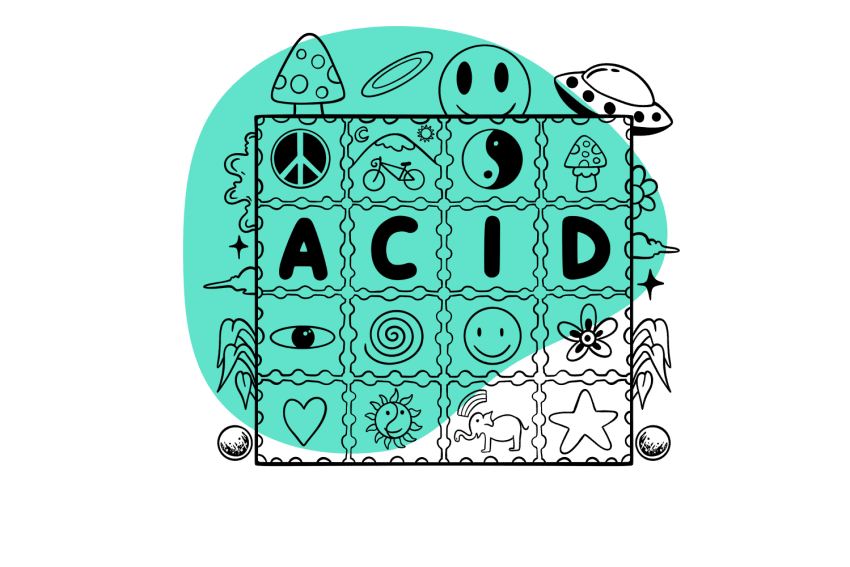
By now, you’ve probably heard about the powerful psychedelic compound known as acid.
It’s famous for being the inspiration behind many of the Beatles’ hit music, driving the counterculture of the 1960s, and for its (attempted) use by the CIA as a mind-control agent in the MK ULTRA project (more on this later).
In this guide, you’ll learn everything you need to know about LSD.
We cover dosing, what to expect after you take it, and touch on the interesting history of perhaps the most famous psychedelic in the world.
We’ll also review the research supporting the therapeutic use of LSD for addiction, depression, anxiety, and cluster headaches.
Let’s start with the basics by exploring what LSD actually is.
Listen to the article:
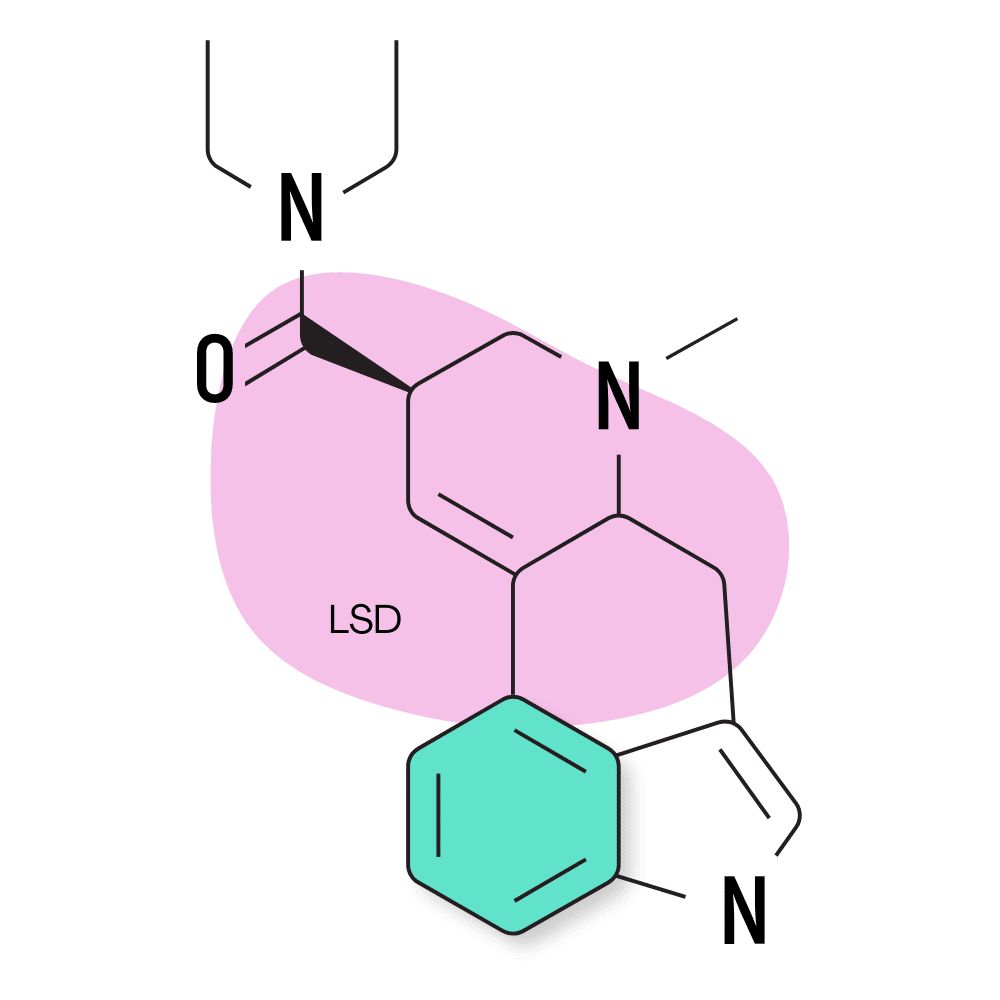
What is LSD?
LSD is a semi-synthetic derivative of a group of compounds called lysergamides. These compounds are primarily found in a species of rye fungus called ergot.
LSD works by activating serotonin receptors in the brain — which produces changes in visual, auditory, and tactile perception. It promotes introspection and dissolving of the “ego”.
An acid trip can last anywhere from 8 to 12 hours.
Conventional uses of acid revolved around self-growth and spiritual exploration — but research has also shown a lot of promise for LSD as a treatment for psychiatric disorders.
It has the ability to “reset” the default mode network — which is a series of brain processes that control our inner sense of self-worth and ego. Hyperactivity in the default mode network has been linked with depression, anxiety, obsessive-compulsive disorder, addiction, and more.
LSD: Specs & Technical Details
| Active Ingredient | Lysergic acid diethylamide |
| Level of Risk | Low |
| Other Names | Acid, Lucy, Mellow Yellow, California Sunshine |
| Most Common Side Effects | Anxiety & paranoia |
| Duration of Effects | 6 – 10 hours |
| Legality | Illegal in most parts of the world |
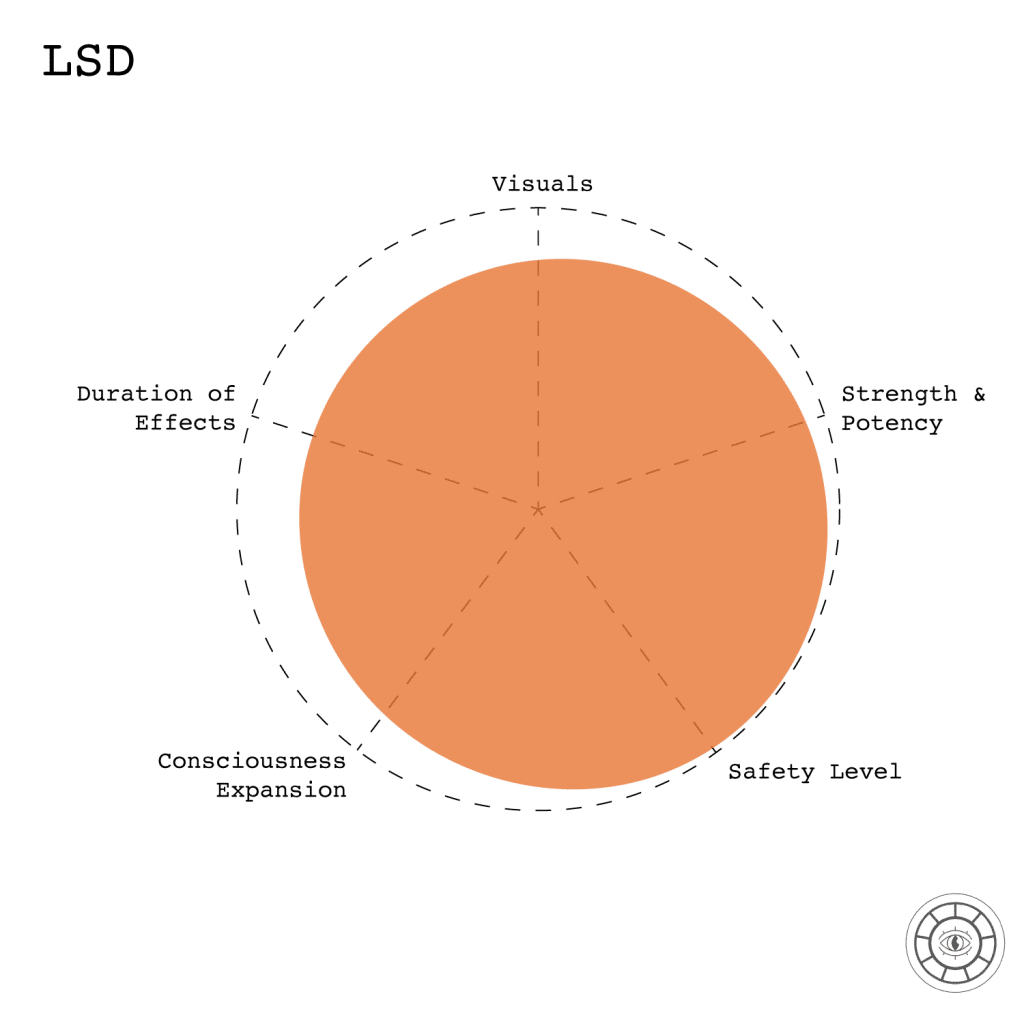
Common Names For LSD
LSD has been around for over 60 years now and has accumulated many nicknames over the years.
Here are some of the most prominent names for LSD:
- Acid
- Lucy
- Mellow Yellow
- Window Pane
- California Sunshine
- LAD (the English acronym for lysergic acid diethylamide)
Trip Sitter Safe LSD Guidelines
- 📚 Learn the four pillars of responsible psychedelic use — set, setting, sitter, & substance
- 👀 Know your dose — the standard dose for LSD is about 80 μg
- 🧫 Test your substances — always test your LSD with a reagent test kit before you start
- ⏱️ Know the timeline — the effects of LSD are going to last between 7 and 12 hours
- 👥 Have a trip sitter nearby — someone you trust who remains sober throughout the experience
- 🧪 Don’t mix — it isn’t safe to mix LSD with other drugs, medications, or alcohol
What’s The Dose of LSD? (LSD Dose Calculator)
The most common dose for LSD is about 80 micrograms — which is the average amount of LSD in a standard square of blotter paper (+/- 10%).
Depending on the manufacturer, the dose per blotter square can range from about 20 mcg of LSD to 100 mcg.
The usual dose is to take one blotter square at a time. Some people will take two or even three doses. Only people with a lot of experience using LSD should even consider taking more than one square at a time. It’s easy to underestimate the effects of LSD until it’s too late.
Many people will take one square and prematurely take another after an hour when the effects aren’t “strong enough.” Sixty minutes later, you’ve got two full doses of LSD. Once you’ve taken the LSD, you can’t un-take it. You’ll feel the effects no matter what you do — so make sure you don’t take too much.
Double-check the potency of the DXM you’re using, and look for the addition of other compounds such as acetaminophen which can cause severe liver-toxic side-effects at this dose.
Microdose
(10 – 25 micrograms)
Any dose below the psychoactive threshold is considered a microdose. This means the dose isn’t strong enough to make you hallucinate.
The threshold for LSD is 25–50 mcg — so most people will take around half or less of that as a microdose (10 – 25 mcg).
The purpose of microdosing isn’t to “trip.” It’s used as a tool to promote a heightened sense of focus and productivity, boost creativity, and support mental health conditions like depression and anxiety over long periods of time.
The main benefits of microdosing appear gradually over the course of several weeks or months.
There are a few different philosophies on the dosage schedule while microdosing. The most common is the protocol outlined by Dr. James Fadiman — a prominent psychotherapy researcher. He sought to standardize microdosing to make it easier to research.
Dr. Fadiman’s protocol is to take a microdose of LSD every third day for a full month.
You can microdose for longer than this but should never do more than three months at a time before taking an extended break for at least a month.
LSD dosage schedules:
- One day on, two days off
- Five days on, two days off
- One week on, one week off
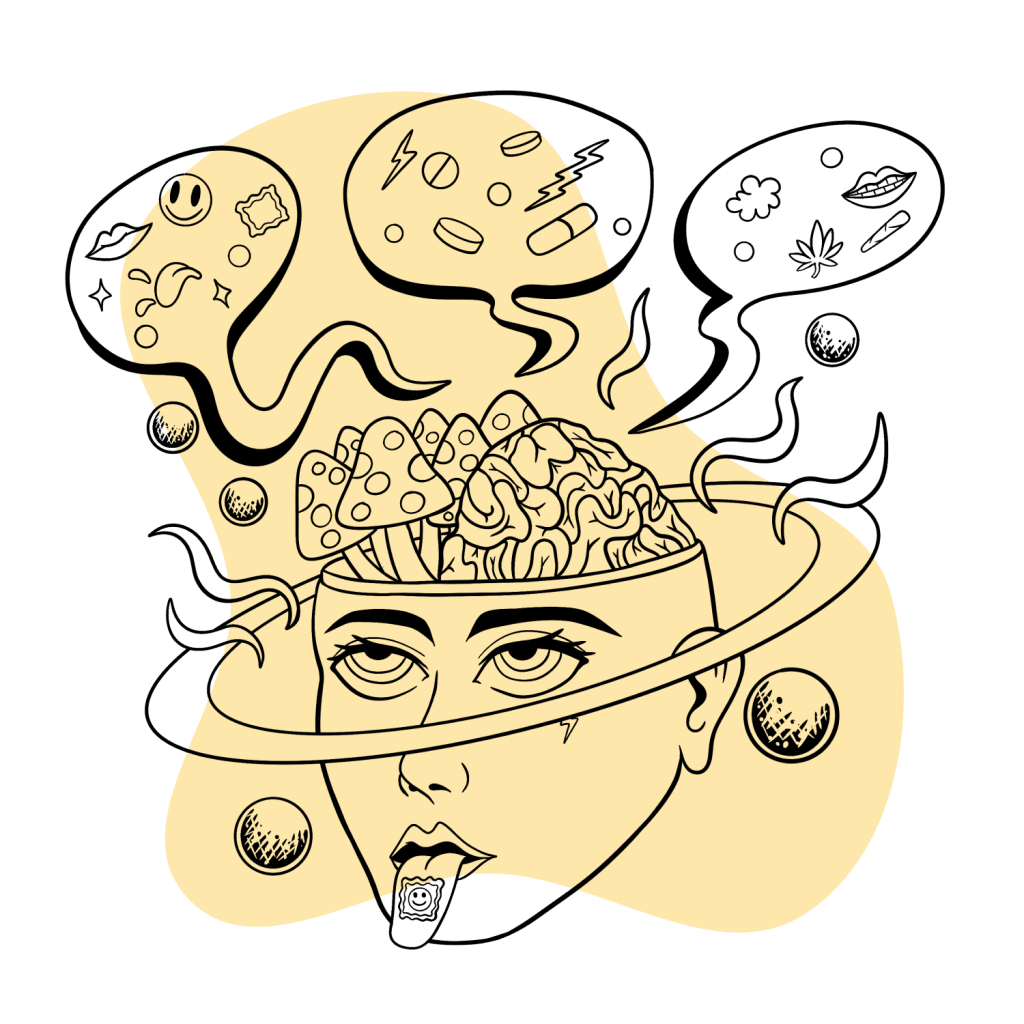
The Standard Psychoactive Dose
(80 – 200 micrograms)
The average psychoactive dose of LSD is very low — around 80 to 200 micrograms. Even a dose of 20 mcg is enough to produce subtle changes in perception.
The high potency of acid makes measuring the dose difficult. A single drop of acid that’s been diluted for making blotters contains around 70 mcg.
However, a single drop of an undiluted LSD solution could contain as much as 70,000 mcg.
Instead of measuring out drop doses, manufacturers dilute and coat small pieces of paper with LSD and cut them into squares for individual doses. This is referred to as blotter paper.
These paper squares are then placed in the mouth and held there to allow the active ingredient to absorb through the mouth’s mucus membranes.
It’s hard to know what the exact dose is for a single square of blotter acid paper. Factors like how the LSD was stored, whether it was exposed to sunlight or not, and the potency of the acid used to make it can all affect the dose per blotter paper.
You can get a rough gauge on the dose per piece based on its effects. If you or someone else has taken acid cut from the same sheet of blotter paper, you’ll be able to get an idea if it’s on the high-end of the dose (100 mcg LSD) or the lower-end (20 mcg). If you’re not sure, it’s wise to start with just a single piece rather than underestimating the effects and taking too much.
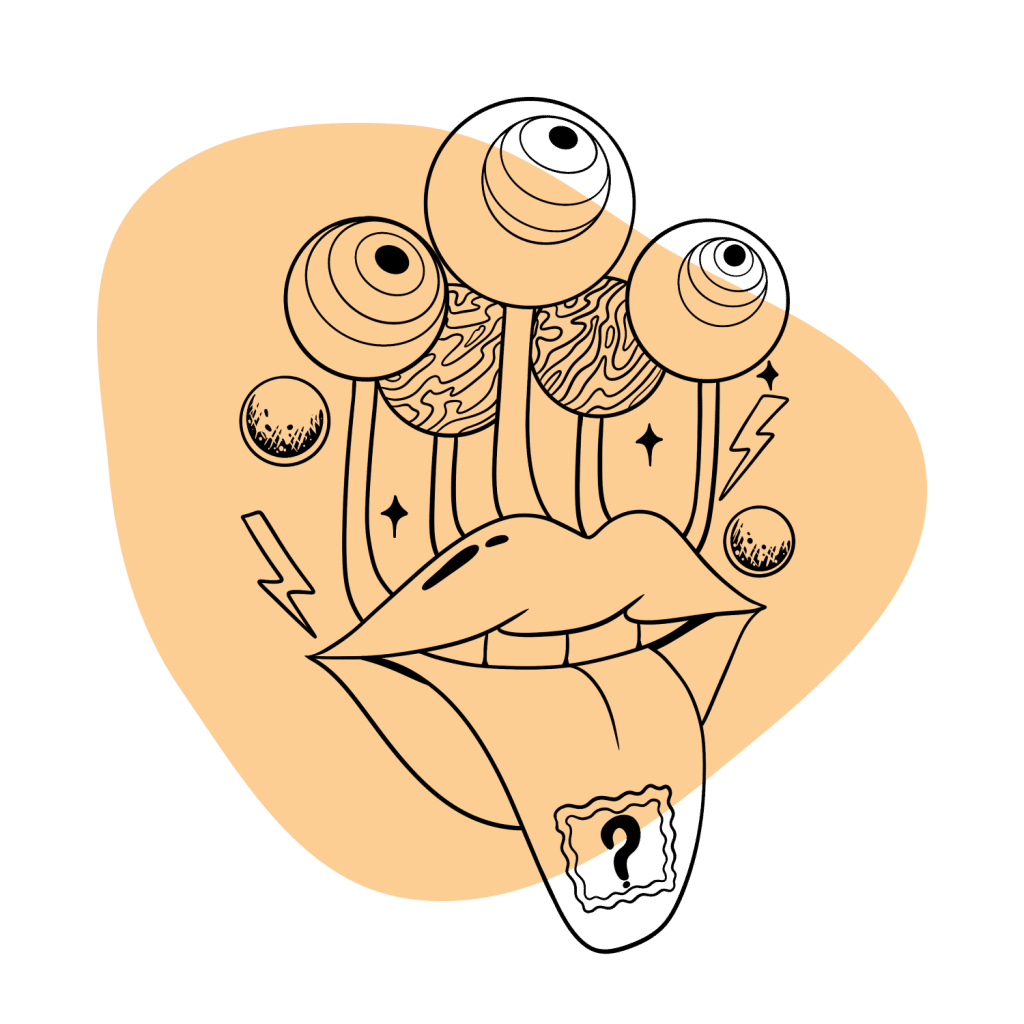
Heroic Dose
(200 – 400 micrograms)
A heroic dose is considered any amount above 200 micrograms. These doses are powerful and produce dramatic shifts in the perception of reality. At this dose, you’re likely to experience dissociative thoughts, loss of ego, visual and auditory hallucinations, and out-of-body experiences.
This dose should never be attempted by anybody who doesn’t already have a lot of experience using LSD or is under the direct supervision of a trained psychotherapist.
While this dose can provide incredible insights and introspective benefits, it also brings a much higher risk of a “bad trip”.
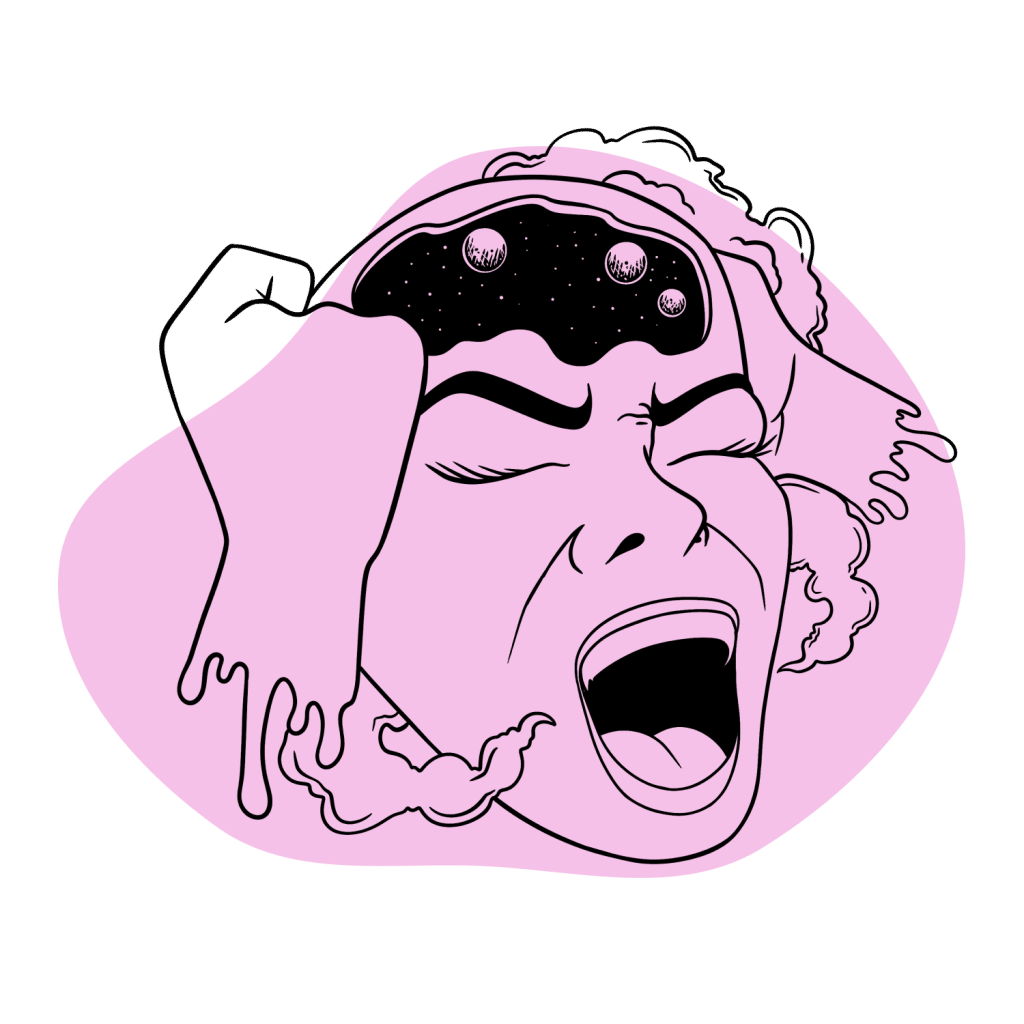
LSD Tolerance
The body forms a tolerance to all tryptamine psychedelics relatively quickly. This includes LSD, DMT, LSA, and psilocybin.
Tolerance means the body becomes resistant to the effects of a drug. You’ll need to take a larger dose the second time you take it to match the intensity of the initial dose.
Tolerance to LSD usually develops after a single dose and can take two weeks to reverse entirely.
If you take a 100 mcg dose of acid today, you’ll need to take roughly 280 mcg tomorrow to experience the same intensity of effects. However, if you wait for about two weeks, you’ll only need to take 100 mcg to get the same effects all over again.
How Does Tolerance Form?
Compounds like LSD push the balance of receptor activity outside normal parameters. More specifically, LSD activates the 5-HT2A receptors in the brain — causing psychoactive effects. The activity of 5-HT2A goes so far outside the normal range; the body automatically makes changes to reduce the effect.
In order to reduce the activation of these receptors, the body will “hide” some of them. The next time you take LSD, fewer receptors are available for it to exert its effect — producing less impact.
Over the course of 10-14 days without the drug, these receptors will become “unhidden,” and LSD has the same level of impact it had the first time all over again.
Also see: Is LSD Addictive?
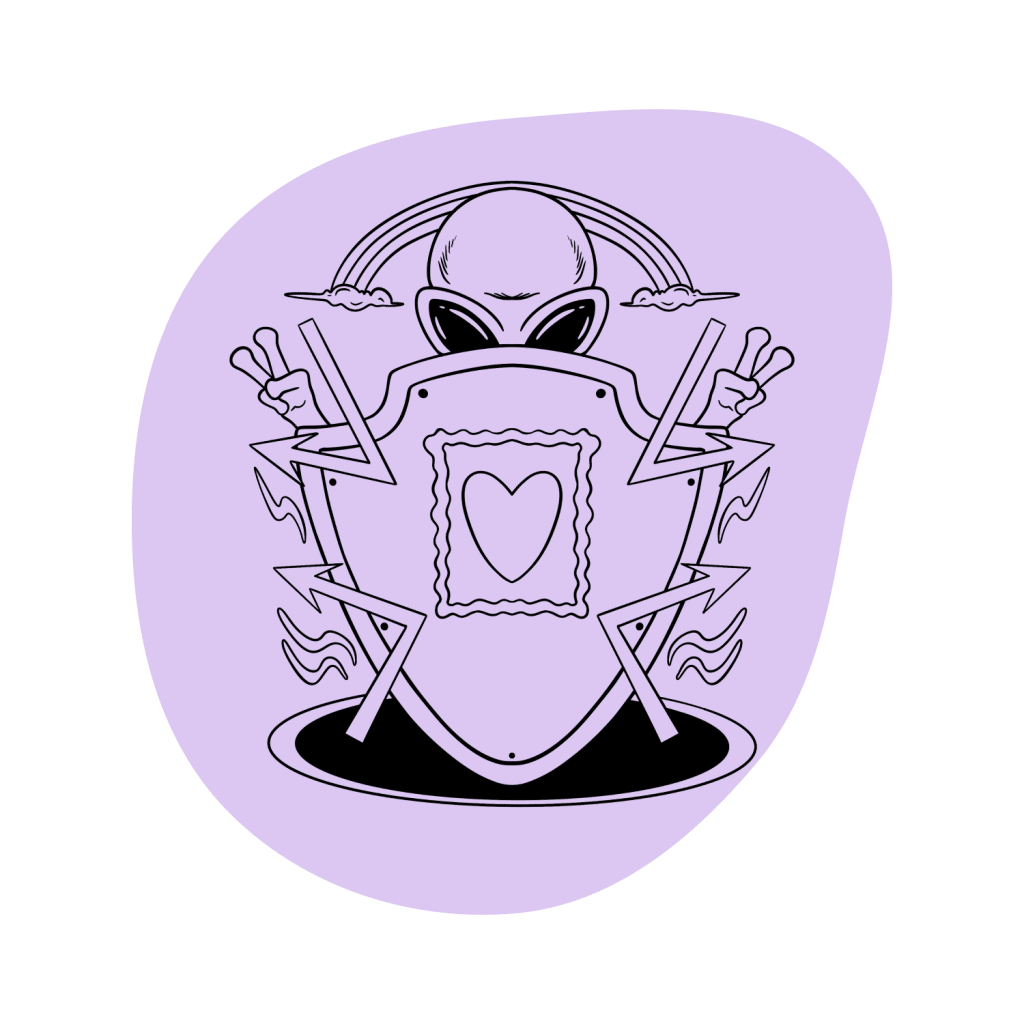
LSD Tolerance Calculator
Check out this simple LSD tolerance calculator to help you find the approximate dose to overcome the effects of tolerance when using LSD more than once in a two-week window.
*Note, aside from microdosing, it’s recommended that you avoid taking LSD more than once every two weeks.
This calculator is only able to provide an estimate. Please do not be deceived by the apparent precision of the numbers. For the best experience, let 2 weeks pass between each trip, tolerance should be back to normal after 14 days.
What Does LSD Feel Like?
Every LSD experience is unique. The effects of the drug feed off your own thoughts and imagination, so the direction a particular trip can take depends on how you’re feeling, the stimuli in your environment, and the people you’re with.
In general, the effects of LSD are usually positive. While it’s possible to have a negative experience (aka, a bad trip), the right preparation (positive mindset, comfortable setting, and a trip sitter) can dramatically reduce the chances of this happening.
Most people report introspection, laughter, and creative insight while taking LSD.
Many of these experiences resonate with people for years after the experience — such as realizing the importance of some of your personal relationships, recognizing toxic thought patterns, and more.
LSD can produce the following feelings:
- Euphoria
- Increased sense of empathy
- More mental energy
- A strong sense of awe & wonder
- Visual and auditory hallucinations
- Altered perception of time (time feels faster or slower than normal)
- Giddiness and laughter
Not all of the effects of LSD are positive. It’s important to be aware of the negative effects that can arise periodically throughout the trip. If these feelings appear, it’s important to remember that they’re only temporary. As soon as you stop focusing on them, they tend to disappear. Resisting these feelings only makes them worse.
Having a trusted guide with you during your trip — especially if using higher doses — is the most effective way to avoid or dissolve negative feelings during the trip.
Some of the more negative feelings that can arise include:
- Confusion and frustration performing routine tasks
- Feelings of fear or anxiety
- A heightened level of suspicion about others (paranoia)
- Seeing or hearing things that aren’t there
- Feelings of being overwhelmed
How LSD Feels According to Dose
- <20 mcg — sub-psychedelic dose, produces a heightened level of awareness and creativity
- 25 – 40 mcg — threshold experience, produces changes in visual & auditory perception
- 60 – 120 mcg — substantial experience, produces strong hallucinations, introspection, & dampening of the DMN
- 120 – 300 mcg — profound experience, effects at this dose are very strong and often lead to life-changing experiences
- >300 mcg — out of body experience, temporary loss of touch with reality, similar to DMT experience
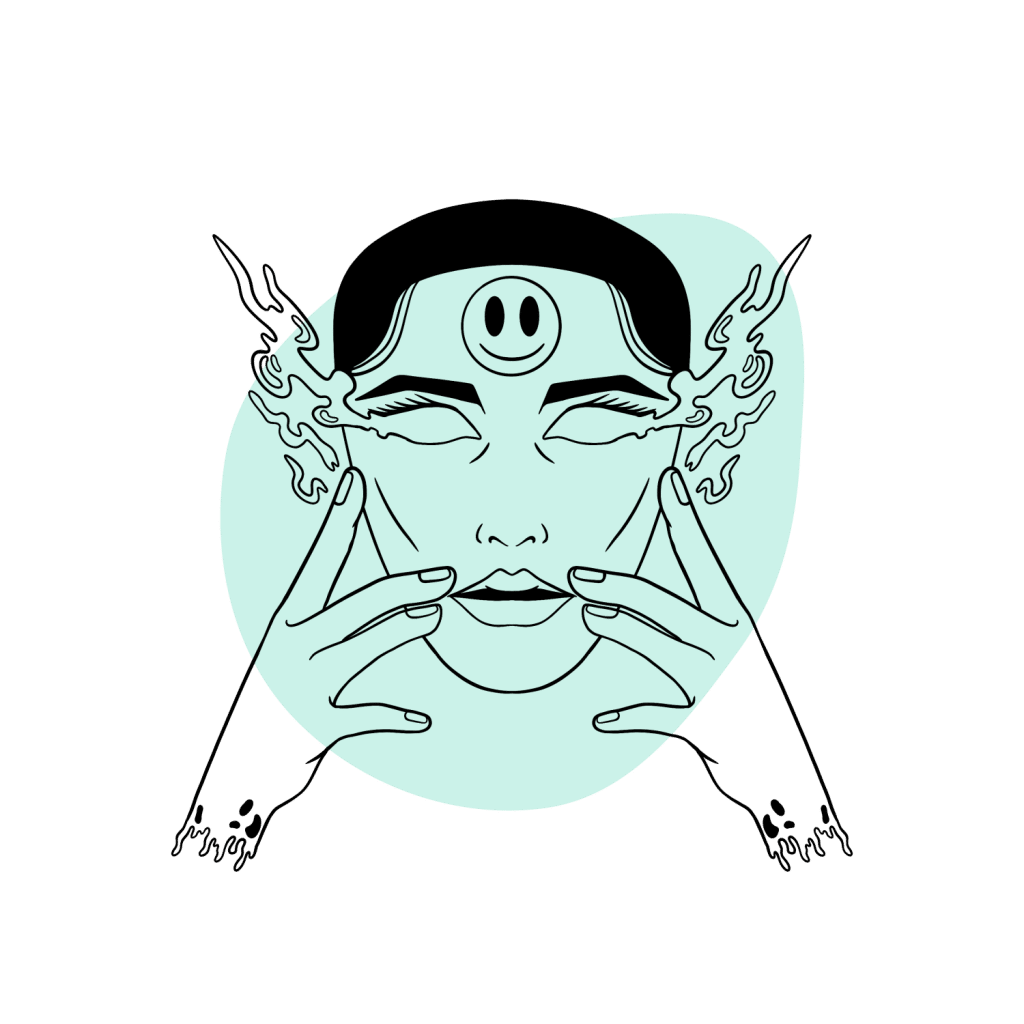
LSD Trip Timeline: When Does it Start? How Long Does it Last?
Acid takes around 30 to 60 minutes before it starts to kick in. If you hold the blotter paper under your tongue, it may be even faster.
Acid is one of the longest-lasting psychedelics — in some cases providing psychoactive effects for up to 12 hours. The average duration is closer to 7 hours before you’re about 95% back to normal. Residual effects can linger for several more hours, involving feelings of introspection and mild visual distortions.
Here’s what a typical timeline for an acid trip looks like:
T0: The Initial Dose
This is when you first take LSD — marking the start of the journey.
T30: Onset Of Effects
Mild effects may start to appear, starting with a tingling sensation in the stomach. By T60, you’ll begin to see some visual perception changes (objects appear to be moving or vibrating). This is usually accompanied by laughter and giddiness.
T120: Peak Effects
Two hours in, the effects will be blatantly obvious. You may feel euphoric, giggly, and introspective. You’ll be experiencing both visual and auditory hallucinations at this time.
The effects of the drug can be quite intense around this time. This is the period where the heavier side of acid happens. You may experience dissociative thoughts, ego death, and in some cases, out-of-body experiences.
This is the most critical stage to have a trip sitter nearby to help you through any challenging experiences. The hallucinations and dissolving of the ego can cause paranoia, anxiety, and fear. Taking steps before taking LSD — such as finding a trusted trip sitter and finding an environment that’s comfortable and safe — is the best way to avoid problems during the peak effects.
T240: The Slow Downhill Fade
Around the four-hour mark, your trip will have already reached a climax and will start to decline.
You’ll go through periods of high intensity, followed by periods of lower intensity. This waxes and wanes over the next three hours, each time reaching a lower “peak” at the top of the wave.
T360: The Comedown
By hour six, the effects will be dramatically reduced. Some people find they’re back to normal by this time; others may still be experiencing residual effects from the drug.
This period remains full of introspective thoughts as you replay the experience you just went through. Many people feel very relaxed at this point and usually end up in a comfortable position lying or sitting down as you ponder the experience you just went through.
You’ll feel lazy and relaxed — but not tired. This is a great time to journal or talk about your experience with the rest of your group.
T600: The End of the Trip
This is the 10-hour mark. The majority of people will be completely back to normal at this point. Most people will start to feel sleepy by this point as the brain seeks the opportunity to recharge.
You’ve spent the past 10 hours exploring, moving around, and thinking at a high level.
This is a good time to get some rest and get a fresh start tomorrow.
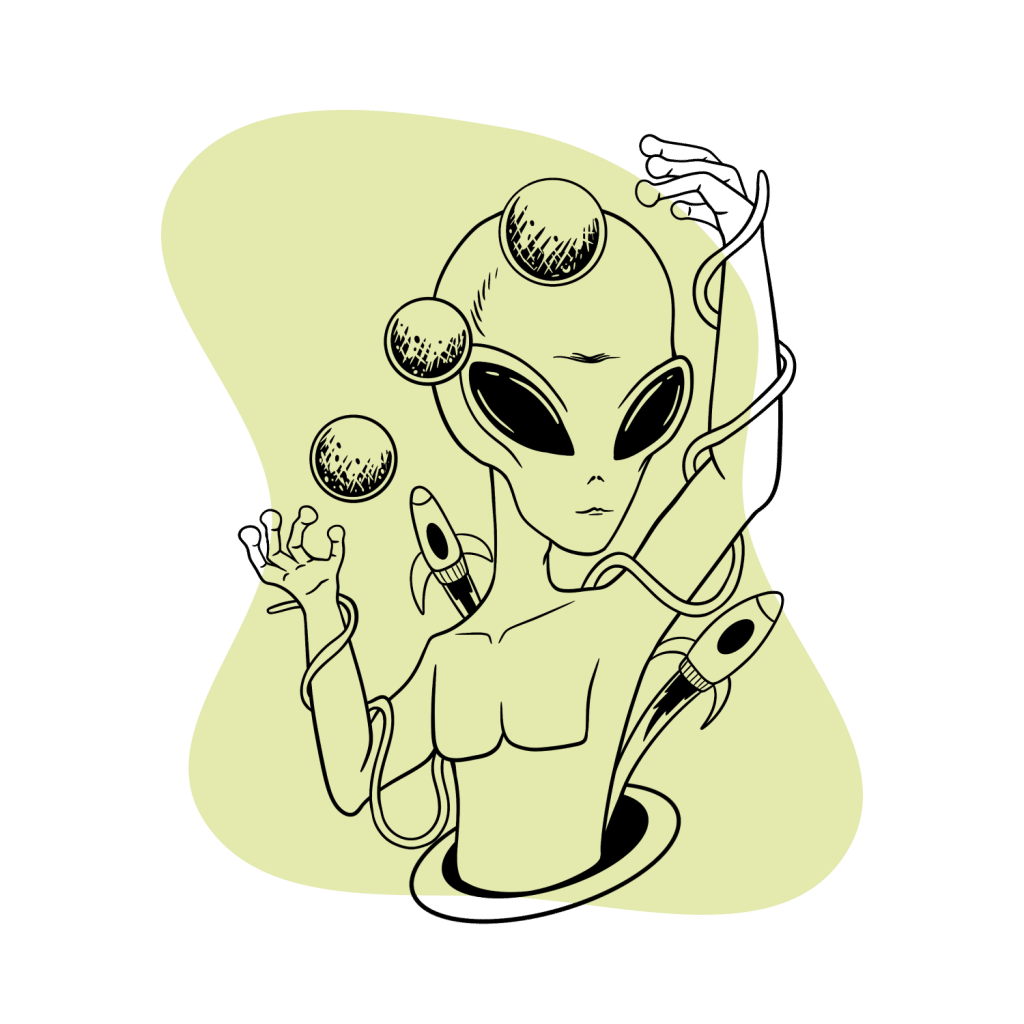
Is LSD Legal?
LSD is illegal in most parts of the world. It’s listed as a Schedule I drug on the UN Convention on Psychotropic Substances (1971). This means all countries taking part in this convention are expected to include LSD on their prohibited substances list.
Related: List of legal psychoactive substances.
There are currently no countries where LSD is considered legal — however, there’s a growing list of countries, states, and municipalities that have moved to decriminalize LSD.
Decriminalization doesn’t make a substance legal — it just removes the penalties for being in possession of personal amounts of the drug.
Countries That Have Decriminalized LSD:
Europe
- Armenia
- Croatia
- Czech Republic
- Estonia
- Germany
- Italy
- Netherlands
- Norway
- Poland
- Portugal
- Russian Federation
- Spain
- Switzerland
North & South America
Local States & Municipalities
- Washington DC, USA
- Oregon, USA
- Vancouver, Canada
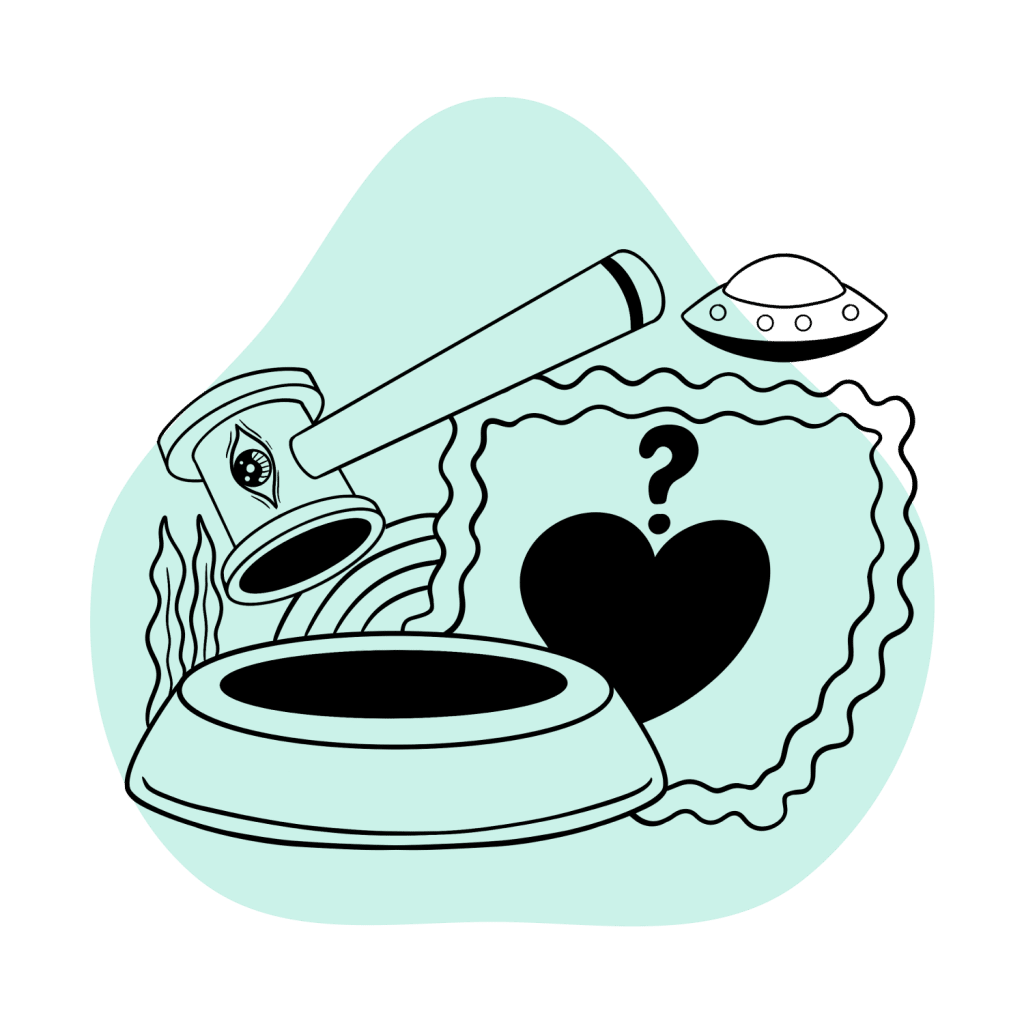
Is LSD Safe?
There are over 60 years of research to prove LSD is both non-toxic and non-addictive. There have never been any reported overdose cases from people taking too much LSD, and there’s no indication of addiction to LSD.
Tolerance formation is possible in people who take LSD often — prompting them to take larger doses to get the same effect. However, when they stop taking LSD, no symptoms of withdrawal or cravings are reported.
The best way to assess the toxicity of a drug is to find the LD50. This term in medical research describes the amount of a drug needed to kill roughly 50% of the study participants (usually mice).
There has yet to be an established LD50 for LSD. Even exceptionally high doses of the drug are non-lethal.
In the 1970s, a group of party attendees mistakenly snorted between 1000 and 7000 micrograms of LSD in powder form after mistaking it for cocaine [4]. This is equivalent to taking roughly 100 doses of acid at once. Some of the people in this group experienced problems with bleeding in the digestive tract, vomiting, and temporary comatose states. Everybody in this group survived the incident unharmed.
Despite the high level of safety, there are some potential risks to using LSD. During the trip, visions and hallucinations can cause bouts of anxiety, paranoia, and intense fear —some of which can cause long-term mental harm.
Another long-term (albeit rare) side effect that can result from LSD use is hallucinogen-persisting perception disorder (HPPD). This disorder is characterized by long-lasting changes to visual or auditory sensory information — sometimes lasting several months or years after the initial trip.
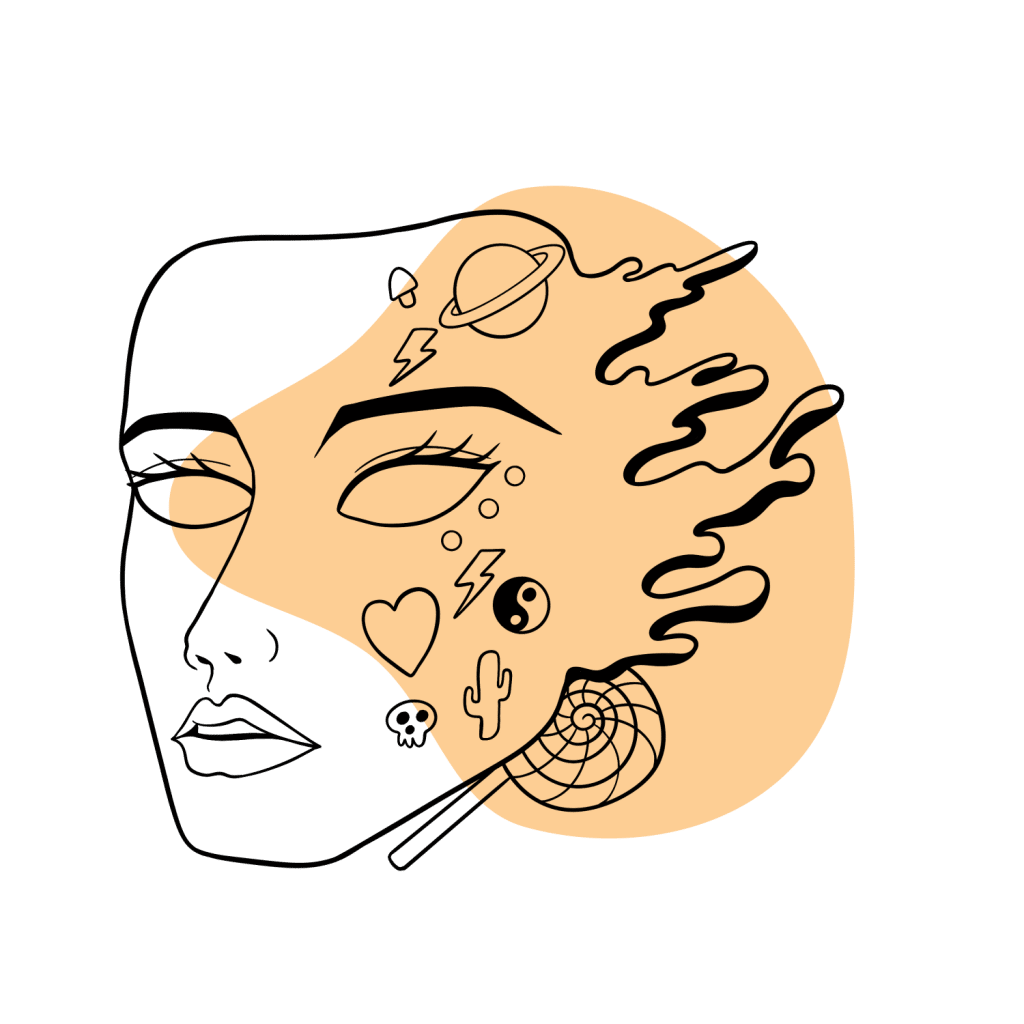
Side Effects of LSD
There are two different categories of side effects from LSD — physical side effects (changes in body metrics like temperature or heart rate) and psychological side effects (changes in perception, mood, and mental condition).
Physical Side Effects of LSD
- Sweating
- Rapid heart rate
- High blood pressure
- Dehydration
- Increased body temperature
Psychological Side Effects of LSD
- Paranoia
- Sense of fear or phobia
- Panic and anxiety
- Synesthesia (“hearing sounds”)
- Hallucinations
- Mental dissociation
Suggested Reading: What Are The Long-Term Effects Of LSD?
How Strong is LSD Compared To Other Psychedelics?
LSD is considered moderate in terms of strength. It produces much less psychoactivity than a drug like DMT or salvia and more psychoactivity than others like mescaline or marijuana.
LSD is most comparable in terms of effects to magic mushrooms.
You’re unlikely to experience out-of-body experiences on LSD unless you take exceptionally high doses (not recommended).
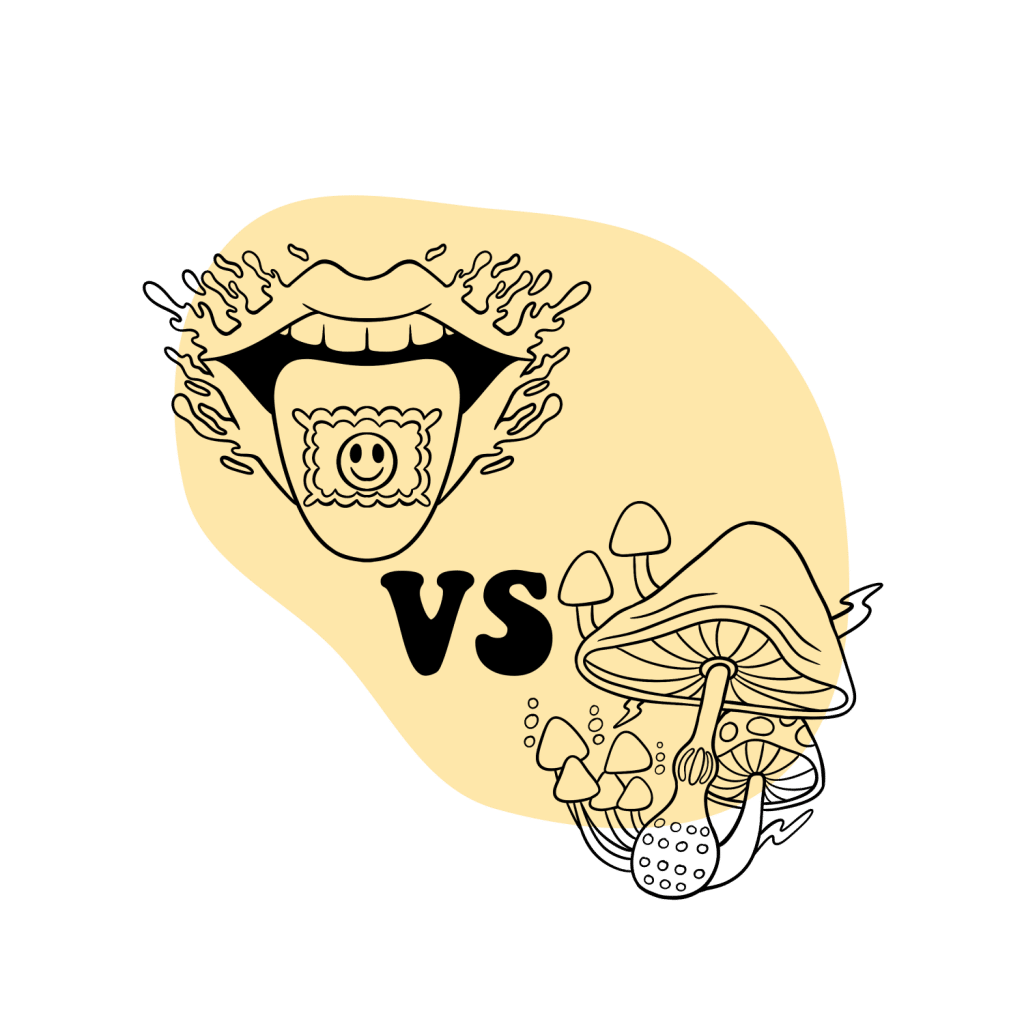
LSD vs. Magic Mushrooms
LSD is very comparable to magic mushrooms in terms of effects. Both LSD and the active ingredient in magic mushrooms (psilocybin) share a very similar structure and interact with the same receptors in the body.
The difference in these two compounds is subtle — mushrooms tend to have a stronger “body high” and have a shorter duration of effects (about 4 – 6 hours). LSD is more “mental”, producing striking changes in visual and auditory sensory perception.
The psychoactive dose is similar for both compounds — starting at around 20 mcg of pure LSD or pure psilocybin.
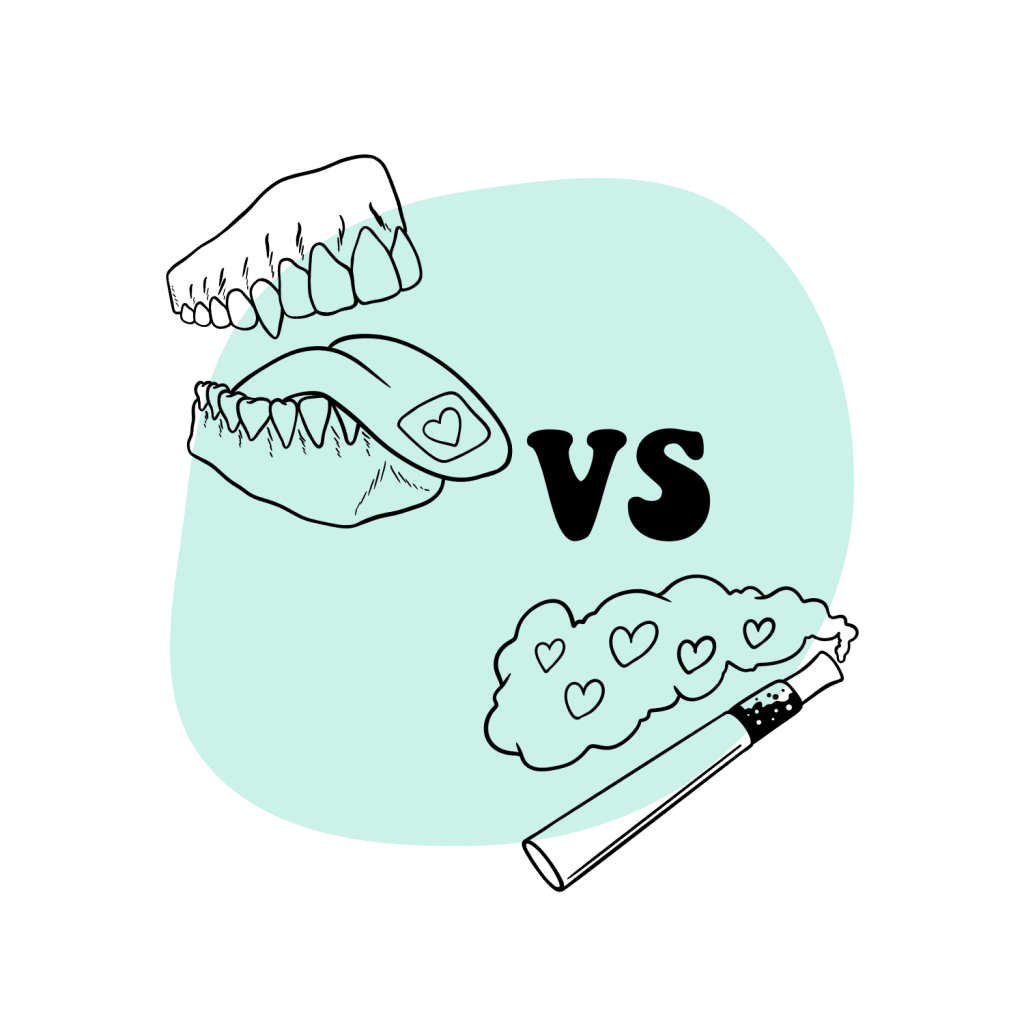
LSD vs. DMT
LSD and DMT (dimethyltryptamine) target the same receptors in the brain. Low doses of DMT share many similarities with LSD, and very high doses of LSD are similar to DMT.
DMT has a much higher chance of producing out-of-body or transcendental experiences — stripping away the ego and forcing introspection.
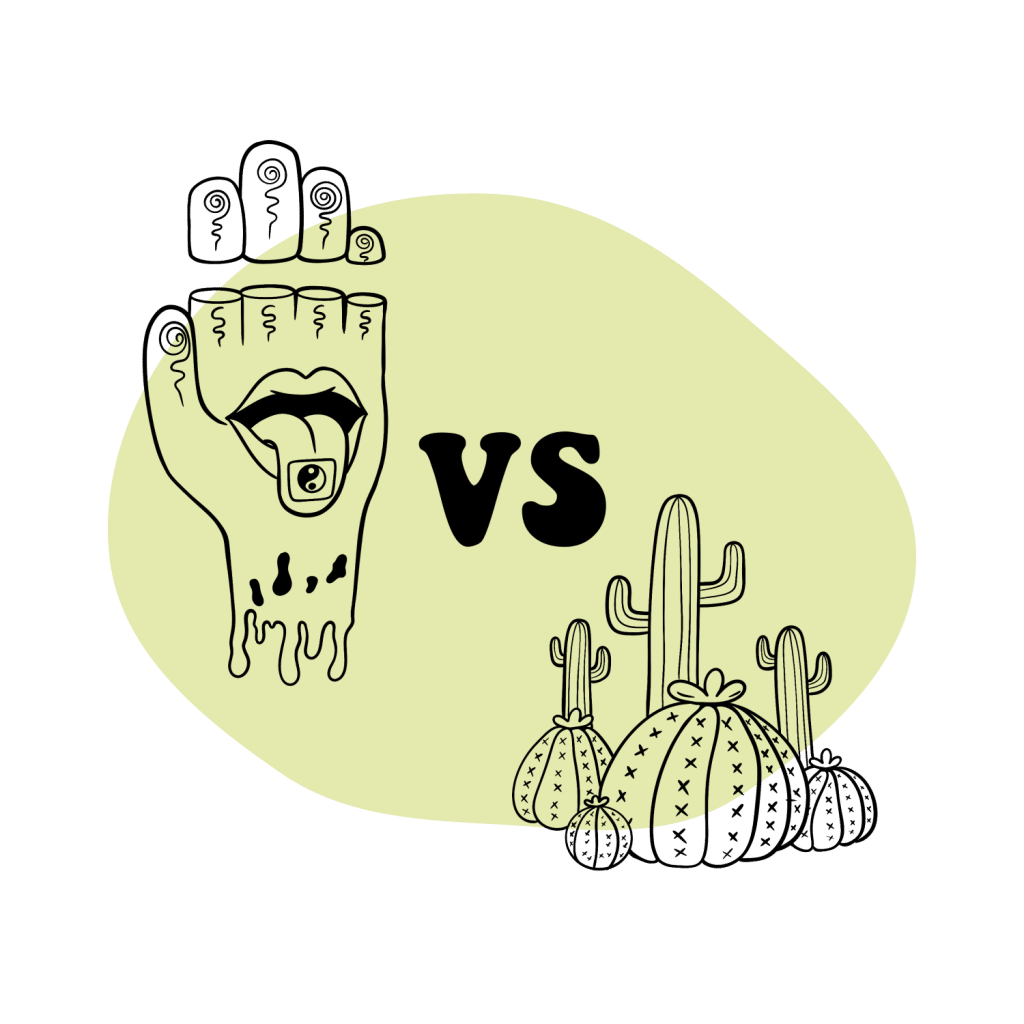
LSD Vs. Mescaline
Mescaline is a psychoactive alkaloid produced in several species of cacti, including peyote and San Pedro. The effects of this compound are very similar to LSD, but with a few distinct differences.
While LSD and mescaline produce kaleidoscope patterns in vision, mescaline has stronger visuals in low-light environments or while the eyes are closed. Mescaline also produces a unique geometricization effect — causing 3-dimensional objects to appear flat and distorted.
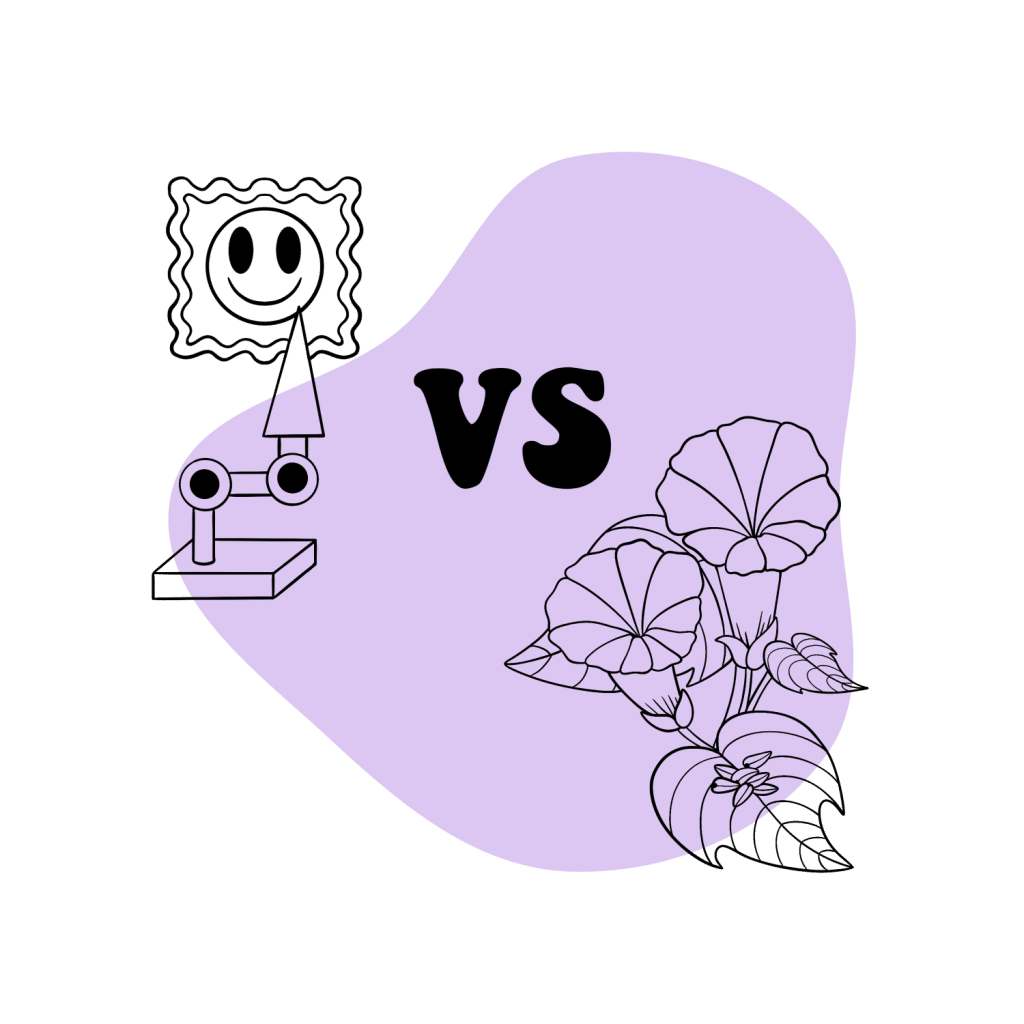
LSD vs. LSA
LSA stands for d-lysergic acid amide — it’s often referred to as ergine. Both LSD and LSA are similar in terms of effects and chemical structure.
Both compounds are classified as ergoline alkaloids (alkaloids extracted or derived from the ergot fungus). LSA is naturally-occurring and can be found in plants and fungi such as ololiuhqui, Hawaiian baby Woodrose (Argyreia nervosa), sleepy grass (Achnatherum robustum), and morning glory seeds (Ipomoea violacea). LSD is a synthetic version derived from other alkaloids in the ergot fungus.
LSA is different from LSD in that it’s also a sedative and produces a much milder trip overall compared to LSD. It produces a feeling described as being heavy.
LSA is also much more inconsistent in terms of its intensity. This is partly due to being derived from plant-based sources, which can yield varying alkaloid concentrations in the final product. LSD, on the other hand, is made in concentrated form in a lab setting — so every dose will be the same.
Psychedelic Research on LSD
LSD For Anxiety
So far, several tryptamine-based psychedelics have been shown to produce a substantial improvement in anxiety symptoms over the years. This includes psilocybin from magic mushrooms, DMT, and LSD. This effect stems from a “resetting” of the default mode network (DMN).
A Swiss study explored the effects of LSD in a clinical setting on ten patients diagnosed with a life-threatening disease [2]. This study’s results were remarkable — after just one psychoactive dose, 66% of patients reported an increase in quality of life, and 78% noted a noticeable reduction in anxiety levels. These effects were sustained at the 12-month follow-up mark — suggesting a single dose of LSD can offer long-term improvements in anxiety symptoms.
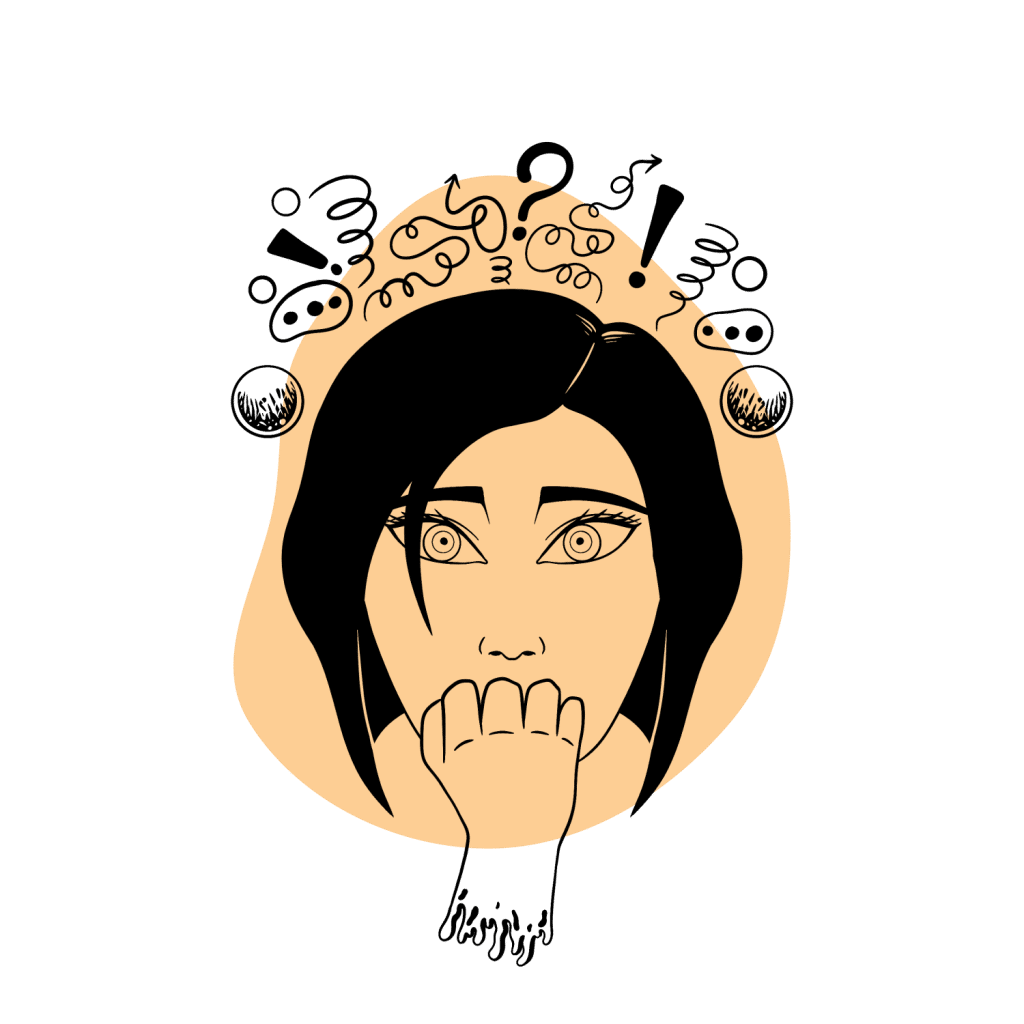
LSD For Addiction
Researchers have been exploring the effects of LSD and other psychedelics for addiction treatment since the 1960s.
LSD was shown to offer particular improvement for the treatment of alcohol addiction.
In 2012, a review paper analyzed the results of six trials exploring the impact of LSD on alcoholism. The studies included in the trial were conducted between the years 1966 and 1970 [9]. In total, 325 patients were treated with LSD, and 211 received placebo control. All patients were administered a single dose that ranged from 210 to 800 mcg of LSD.
The study reported a dramatic reduction in alcoholic cravings at the first follow-up treatment, which was sustained at the final 6-month follow-up. In total, 59% of the LSD patients saw significant improvement in their alcoholism.
LSD For Cluster Headaches & Migraines
LSD is a sub-member of the larger class of compounds called ergotolines — which are derived from the ergot fungus. Several of these compounds have proven useful as a treatment for cluster headaches and migraines.
An article published in Neurology reported that over 80% of study participants who took LSD noticed their cluster headaches were significantly reduced in frequency and severity [1].
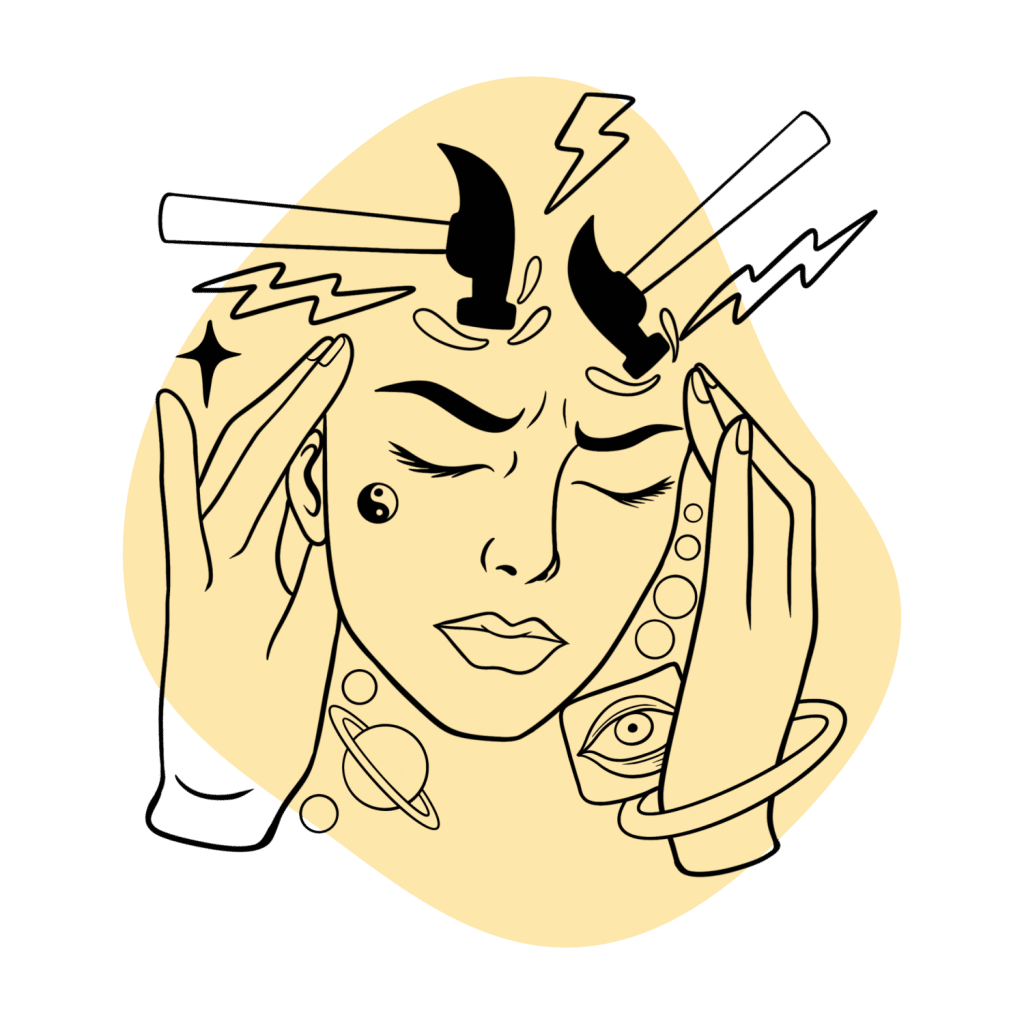
How LSD Works
The chemical structure of LSD is similar to serotonin — which is one of the most influential neurotransmitters in the brain. Serotonin is responsible for regulating mental processes such as mood, arousal, eating habits, digestion, and much more.
The similarities in structure allow LSD to interact with the serotonin receptors [5,8]. In particular, LSD targets 5-HT2A and 5-HT2C receptors. These receptors are responsible for the psychoactive effects of LSD and other tryptamine-based psychedelics (such as DMT or psilocybin).
LSD is different from other psychedelics because it can also activate the dopamine D2 receptors [10]. This ability to modulate the balance between serotonin and dopamine activity is thought to be how LSD provides its powerful hallucinogenic and introspective qualities.
The History of LSD
LSD was first invented in 1938 by a famous Swiss chemist, Albert Hofmann. He was also the same man to isolate psilocybin and psilocin from magic mushrooms for the first time.
Hoffmann discovered acid by accident while working for the pharmaceutical company Sandoz. He searched for a new drug to help with uterine contractions during pregnancy.
LSD, as we know it today, was the 25th compound he synthesized from compounds he extracted from a rye fungus called ergot. His notes listed the compound as LSD-25 — which remains a common name for the drug to this day.
After inventing LSD-25, it was quickly ruled out for having no impact on affecting uterine contractions, so it was shelved for about five years.
In 1943, Hoffmann returned to ergot and resynthesized LSD-25 and other compounds to perform some experiments.
Somehow or another, a few drops of LSD-25 ended up on his skin. About an hour later, he started to experience a “not unpleasant intoxicated like condition, characterized by an extremely stimulated imagination.”
After this experience, Hoffman became understandably interested in LSD-25 and dedicated the subsequent several years to further testing the compound for potential medical applications and toxicity. The first clinical trials for the new drug began in 1947 in a psychiatric hospital in Basel, Switzerland.
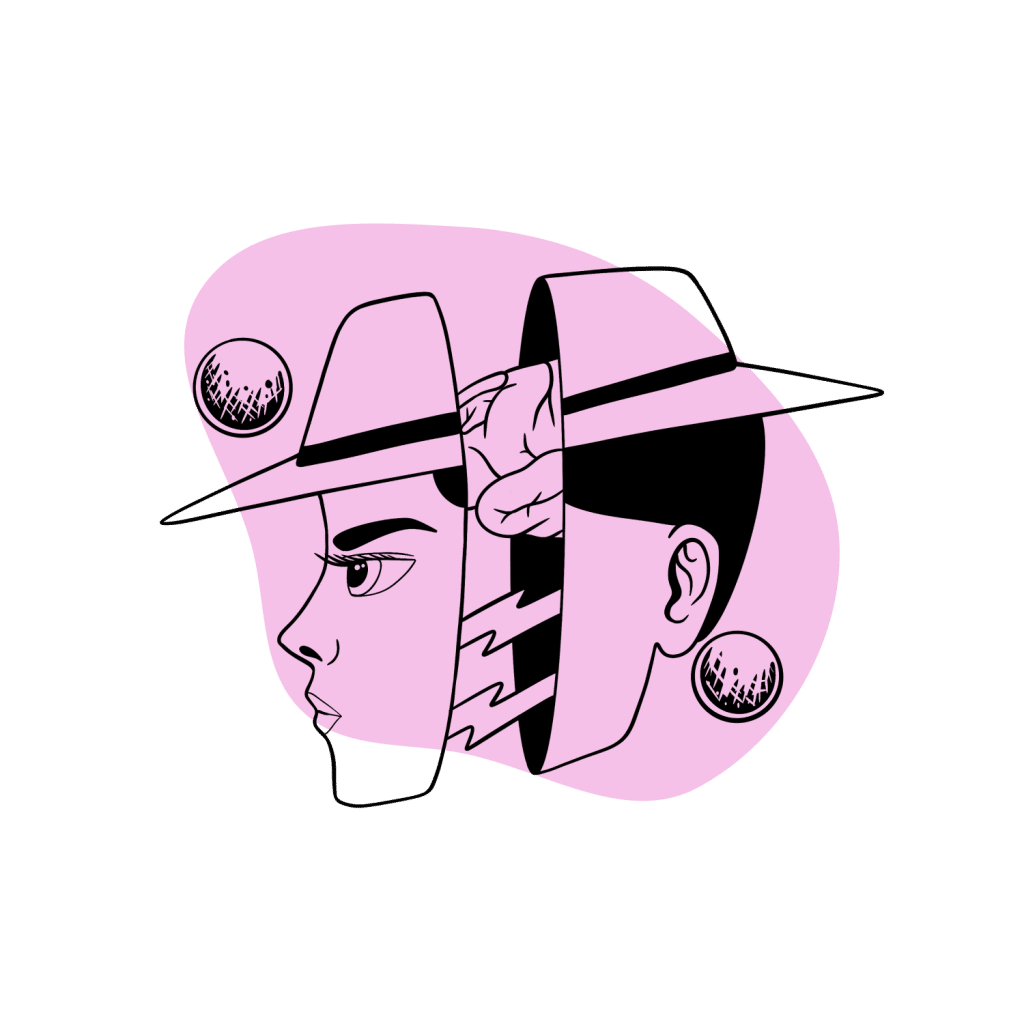
MK-ULTRA: LSD & The CIA
Almost immediately, the CIA in the United States became interested in the new reality-shifting drug. They were interested in the drug as a potential mind-control agent and formed a covert operation under the code name MK-ULTRA.
While MK-ULTRA was active, LSD was administered to CIA agents, members of the public, prostitutes, patients in psychiatric hospitals, and government employees — sometimes with their consent, other times without.
The program was ultimately canned after it became clear that LSD was not the truth serum or mind-control agent they were looking for.
LSD Counterculture
In the 1960s, LSD managed to escape the laboratory and became accessible to the mainstream public. Sandoz (the drug owner at the time) sent large quantities of the drug to virtually any researcher interested in testing it. Professors Timothy Leary and Richard Alpert at Harvard University were two of the primary recipients of this deal in the United States.
Leary and Alpert were approved for a study program by the University to test the drug (which was legal then). They explored the effects of the drug under different conditions on students. Many times both Leary and Alpert were under the influence of the drug themselves while conducting the study. This, along with the notion that Leary and Alpert pressured students to take LSD, led to their dismissal from the university in 1963.
After the two professors were no longer bound to the University, they began sharing everything they knew with the public through public talks, books, and events.
Alpert traveled to India to learn Hinduism. He later wrote several “seminal” books on spirituality under the pseudonym Baba Ram Dass.
Leary went on to publicly promote the use of psychedelics and became a leader in the counterculture of the 1960s. He’s famous for several catchphrases of the time — “turn on, tune in, drop out,” “set and setting,” and “think for yourself and question authority.” He was once described as the “most dangerous man in America” by then-president Richard Nixon.
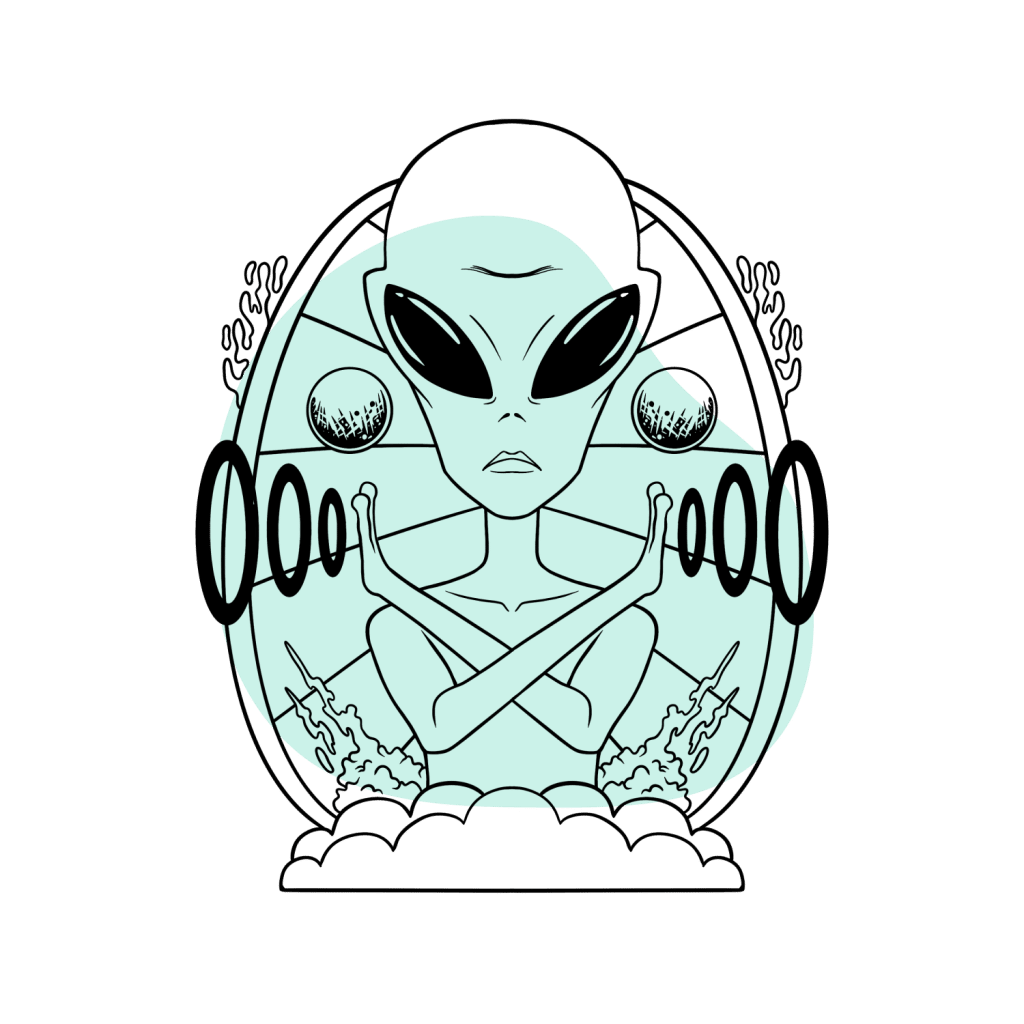
The LSD Prohibition
A man named Dr. Sidney Cohen led the push for a prohibition against LSD and psychedelics. He conducted various studies throughout the 1960s and lobbied the government to introduce laws to prohibit the use of hallucinogenic drugs. He argued that in the wrong hands, LSD could become dangerous.
During this time, the media reported stories about people jumping out of windows while under the influence of LSD, staring into the sun until going blind, and other fantastic (and unfounded) stories aiming to demonize the drug.
It worked.
In 1968, the US federal government banned the possession of LSD and later moved it into the official schedule I restricted drug status in 1970. This category is reserved for drugs with a significant risk of abuse without any medical value — such as heroin or cocaine.
LSD research came to a halt and didn’t start to pick up again until the 1980s. After its prohibition, it became very difficult for research programs to access the compound for further studies. Only a handful of universities retained access to psychedelics during this time.
The New Age In LSD & Psychedelics
We’re currently entering a new wave of psychedelic research. Laws loosen around the world, and the pile of evidence supporting the therapeutic value and high level of safety for psychedelics like LSD is becoming impossible to ignore.
There’s a push towards bringing LSD back into the health system in the form of psychedelic-assisted psychotherapy.
Places like British Colombia, Canada, Oregon, the USA, Mexico, and several US municipalities have legalized or decriminalized the use of psychedelics. More are expected to follow suit over the next couple of years.

LSD Frequently Asked Questions
1. Is LSD Adulterated with Strychnine?
This myth is based on a report by Albert Hofmann, who analyzed a powder that claimed to be LSD that was made of pure strychnine — an extract from a plant called Strychnos nux-vomica.
Strychnine is deadly poisonous and often used to kill rats or other rodents.
Throughout the late 60s and beyond, the strychnine “contamination issue” was used to deter people from using LSD. Older sources claim that strychnine was used as a bulking agent or was accidentally added by bathtub chemists when making illicit LSD using rudimentary chemicals at home. Some reports even claim that strychnine is a byproduct of the breakdown of LSD.
None of this has any truth.
There have never been any reports of strychnine in street LSD. And there’s a good reason for this.
LSD is very potent and almost always dosed as a small 5 by 5 mm blotter paper. If strychnine was added, it would dilute the LSD and remove its ability to induce the psychedelic experience. Likewise, this dose of strychnine is far too low to cause any issues.
LSD is more likely to be adulterated with PCP or NBOMe substances — which is why you should always test a sample of LSD before you take it.
2. Does LSD Cause Chromosomal or DNA Damage?
The idea that LSD causes damage to the chromosomes has been around since the 1960s after a series of reports found that pure LSD caused damage to DNA in vitro. The effects were reportedly similar to that of ionizing radiation. This received a lot of attention in the media but was later disproven.
The problem with jumping to conclusions from in vitro research like this is that the results have very little correlation with the organism at large (in vivo). Yes, raw genetic material exposed to pure LSD can cause it to break down, but the same could be said for just about anything. When we take LSD, we take a few micrograms, which are then distributed through the entire body. It’s not even possible to take enough LSD to drench our genetic material in the same way found in the study.
A few years later, a systematic review explored the effects of 68 studies involving LSD and concluded that there was no risk of damage to the chromosomes and is not a teratogen or carcinogen in humans [11].
Related: Does LSD Cause Brain Damage?
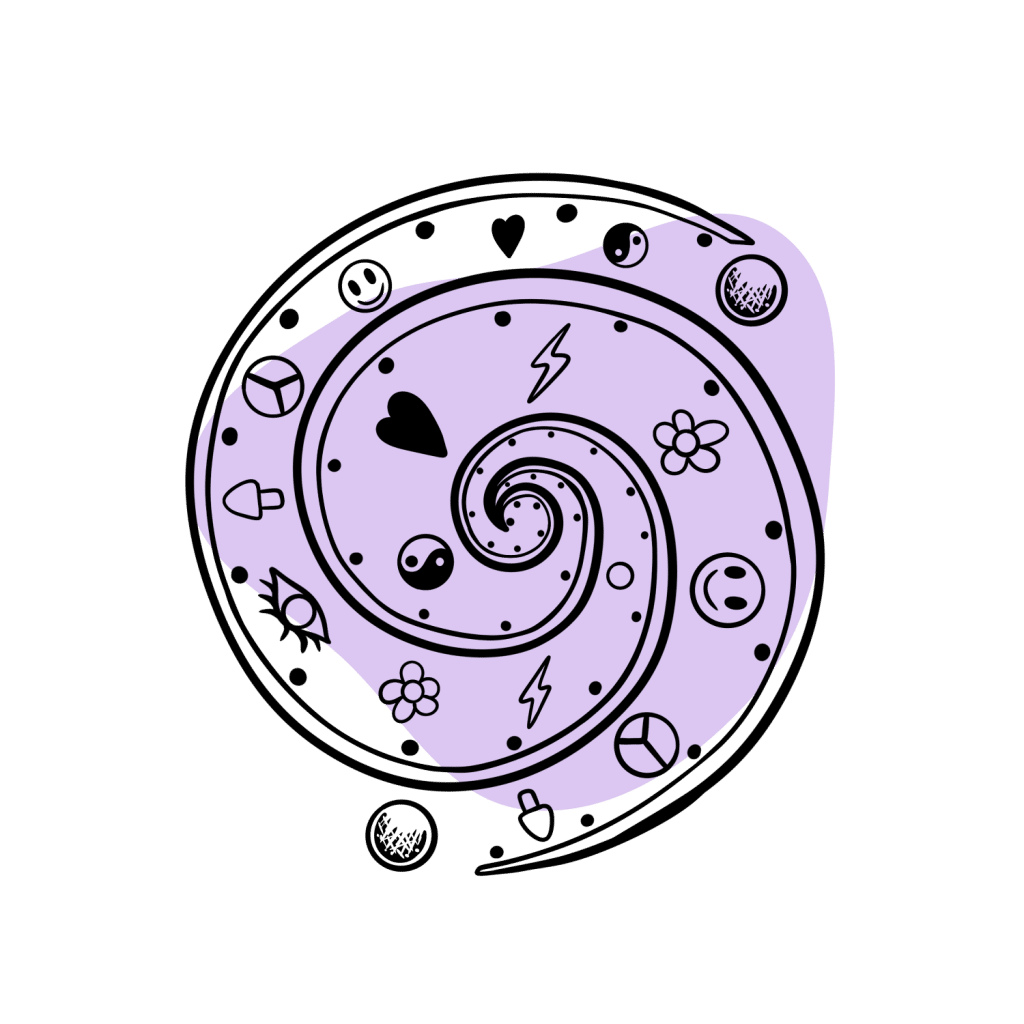
3. Will I Get Flashbacks After Using LSD?
A flashback can be defined as a transitory recurrence of emotions and perceptions originally experienced while under the influence of a psychedelic drug.
In basic terms, the visual and auditory hallucinations accompanying substances like LSD or magic mushrooms can reappear suddenly — lasting from seconds to hours.
This effect is characterized by a condition called hallucinogen-persisting perception disorder (HPPD), according to the DSM-IV.
Flashbacks are exceptionally rare and tend to be short-lived and mild. Most people report a positive experience during a flashback — consisting of feelings of joy, visual hallucinations, and introspection — rather than fear or confusion.
The cause of flashbacks isn’t well understood. Stanislav Grof theorized that flashbacks could happen when someone undergoes a session with LSD or psilocybin and resists facing difficult emotional experiences that surface during the trip. This suggests that flashbacks are the result of poor integration after a psychedelic experience.
The most common myth for what causes flashbacks is that LSD is somehow “stored” in the spinal cord and brain. The myth suggests that LSD can be re-dosed by cracking your back.
There is no scientific basis to this theory, and LSD is not stored in the spinal cord, brain, or anywhere else in the body.
Related: Common Myths & Misconceptions About LSD: Debunked
4. What Are the Best LSD Alternatives?
There are dozens of other compounds that make up the lysergamide class of psychedelics. In fact, LSD isn’t even the strongest or longest-lasting of this class — it’s simply the one that’s received the most publicity.
There are many other LSD alternatives that offer virtually indistinguishable effects, with varying “twists” on the experience (like alterations in the visuals or body high).
Researchers at Purdue University, led by Dr. David E. Nichols, have been exploring various LSD derivatives to uncover their effects. This research is still in its early days, but several of these compounds have since entered the designer drug market and are now widely available online.
Here are the most popular acid alternatives ranked from the most potent, to the least potent:
- ETH-LAD — The strongest LSD alternative. Carries a higher risk of physical side effects.
- LSZ — Stronger than LSD, and better for philosophical discussion or thoughts.
- ALD-52 — Comparable in effects to LSD, with some slight differences in potency.
- PRO-LAD — Milder effects than LSD and less intense visuals. More clear-headed and focused. Most popular for microdosing.
- AL-LAD — Considered to be “beginner’s acid”, but don’t underestimate this formidable psychedelic.
- 1P-LSD — A prodrug for LSD that’s legal in some countries, such as Canada and Costa Rica.
5. How Popular Is LSD?
LSD is, by far, one of the most prevalent psychedelics in North America and Europe.
Recent surveys have found that roughly 1% of the US population has taken LSD within the past 12 months.
In the UK, nearly 5% of the entire population has tried LSD at least once. Canada is only slightly lower with about 4.1% of the population reportedly having taken LSD.
Related: LSD Statistics & Figures
6. What Are LSD Gel Tabs?
LSD gel tabs are similar to the conventional LSD blotter papers, but instead of being infused with a piece of absorbant paper, gel tabs suspend LSD in gelatin.
There are several benefits to gel tabs over blotter papers:
- Gel tabs hold three times as much LSD (though most are made with the same 80–140 mcg doses anyway)
- Gel tabs last longer in storage due (up to three times longer)
- Gel tabs kick in about 15 minutes quicker than paper blotters
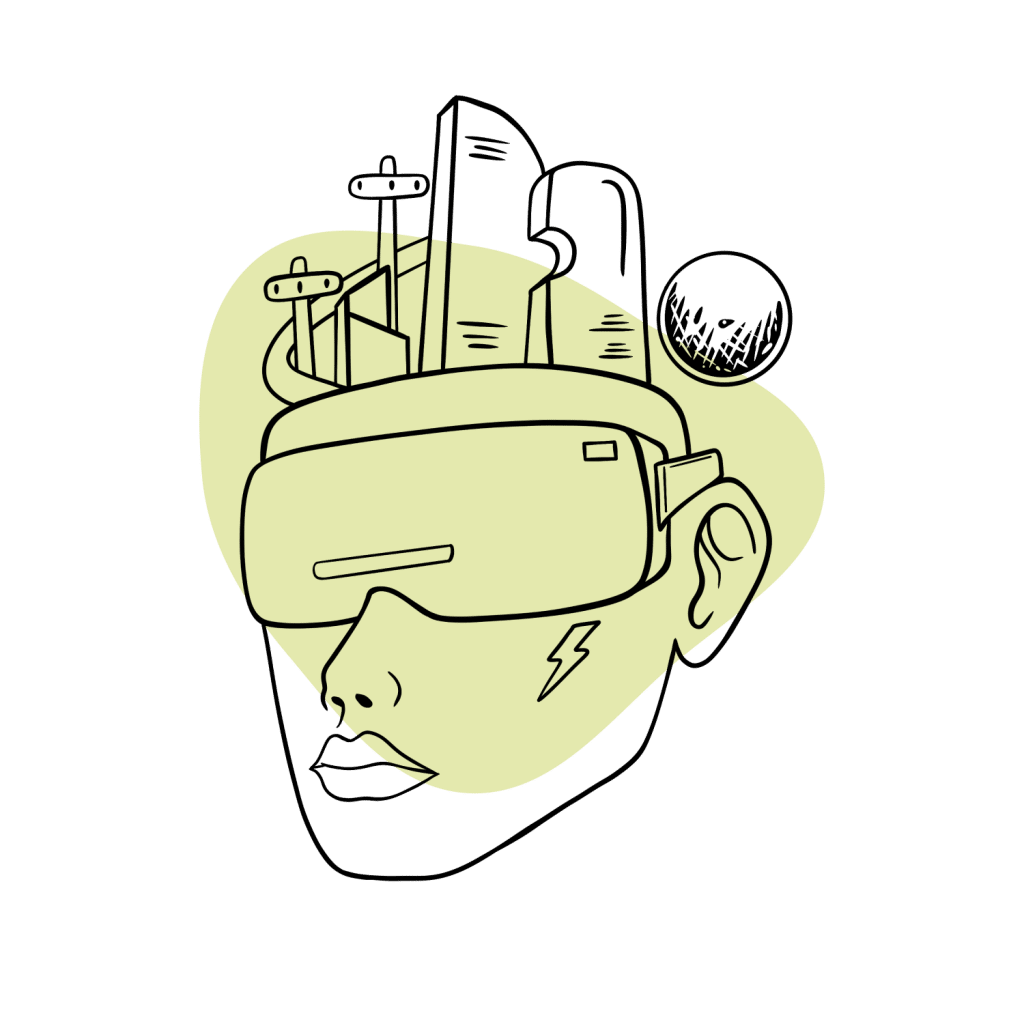
What the Future of LSD Looks Like
LSD is currently illegal throughout most of the world (with a few exceptions). As public interest in psychedelics continues to grow and develop, laws and regulations around this non-toxic substance are starting to open up.
Over the past few years, there’s been a lot of exciting research on the use of this psychotropic compound for treating addiction, anxiety, and depression. There’s also a lot of interesting research currently in the works exploring the role of LSD on resetting the default mode network (DMN).
This is a rapidly developing space. Stay up to date by signing up for our monthly newsletter below.
Subscribe To Get a Weekly Dose of Psychedelics In Your Inbox
References
- Sewell, R. A., Halpern, J. H., & Pope, H. G. (2006). The response of cluster headache to psilocybin and LSD. Neurology, 66(12), 1920-1922.
- Gasser, P., Kirchner, K., & Passie, T. (2015). LSD-assisted psychotherapy for anxiety associated with a life-threatening disease: a qualitative study of acute and sustained subjective effects. Journal of Psychopharmacology, 29(1), 57-68.
- Bogenschutz, M. P., & Johnson, M. W. (2016). Classic hallucinogens in the treatment of addictions. Progress in Neuro-Psychopharmacology and Biological Psychiatry, 64, 250-258.
- Klock, J. C., Boerner, U., & Becker, C. E. (1974). Coma, hyperthermia, and bleeding associated with massive LSD overdose: a report of eight cases. Western Journal of Medicine, 120(3), 183.
- Titeler, M., Lyon, R. A., & Glennon, R. A. (1988). Radioligand binding evidence implicates the brain 5-HT 2 receptor as a site of action for LSD and phenylisopropylamine hallucinogens. Psychopharmacology, 94(2), 213-216.
- Carhart-Harris, R. L., Muthukumaraswamy, S., Roseman, L., Kaelen, M., Droog, W., Murphy, K., … & Leech, R. (2016). Neural correlates of the LSD experience revealed by multimodal neuroimaging. Proceedings of the National Academy of Sciences, 113(17), 4853-4858.
- Berger, M., Gray, J. A., & Roth, B. L. (2009). The expanded biology of serotonin. Annual review of medicine, 60, 355-366.
- Wacker, D., Wang, S., McCorvy, J. D., Betz, R. M., Venkatakrishnan, A. J., Levit, A., … & Shoichet, B. K. (2017). Crystal structure of an LSD-bound human serotonin receptor. Cell, 168(3), 377-389.
- Krebs, T. S., & Johansen, P. Ø. (2012). Lysergic acid diethylamide (LSD) for alcoholism: meta-analysis of randomized controlled trials. Journal of Psychopharmacology, 26(7), 994-1002.
- Seeman, P., Ko, F., & Tallerico, T. (2005). Dopamine receptor contribution to the action of PCP, LSD and ketamine psychotomimetics. Molecular psychiatry, 10(9), 877-883.
- Dishotsky, N. I., Loughman, W. D., Mogar, R. E., & Lipscomb, W. R. (1971). LSD and genetic damage. Science, 172(3982), 431-440.

